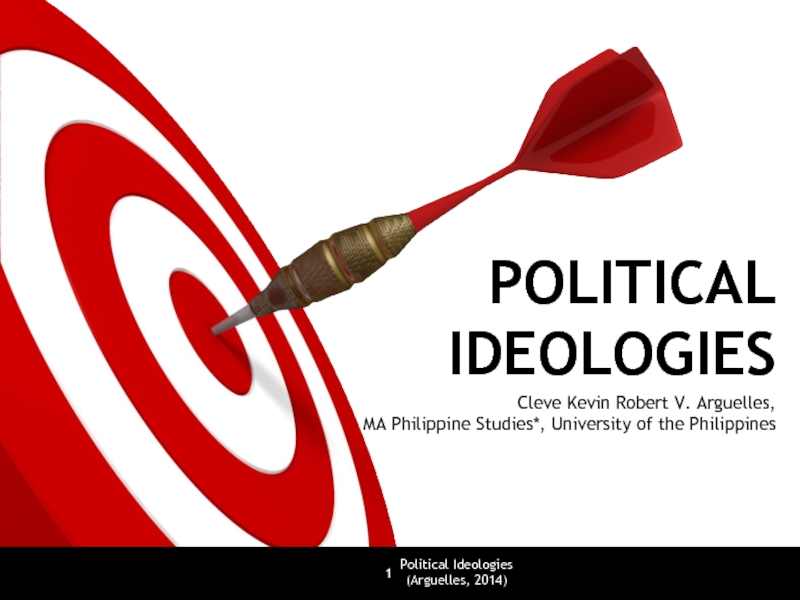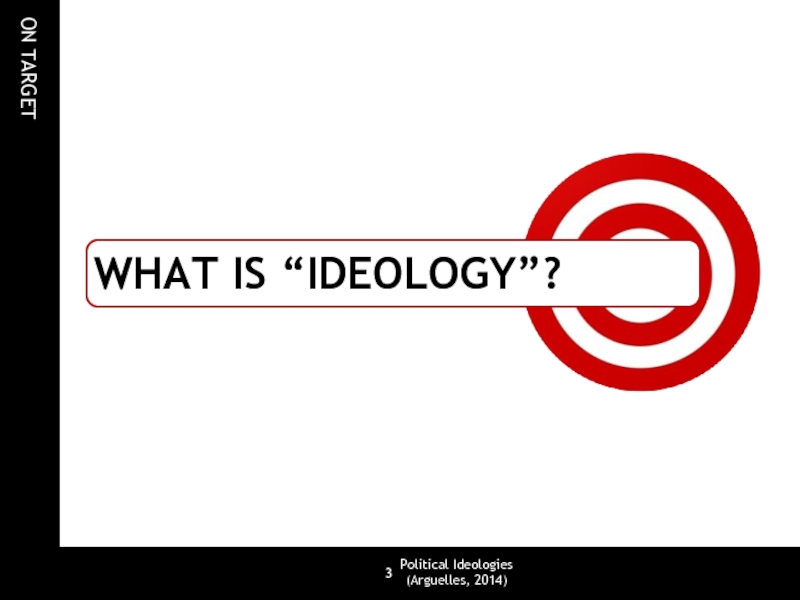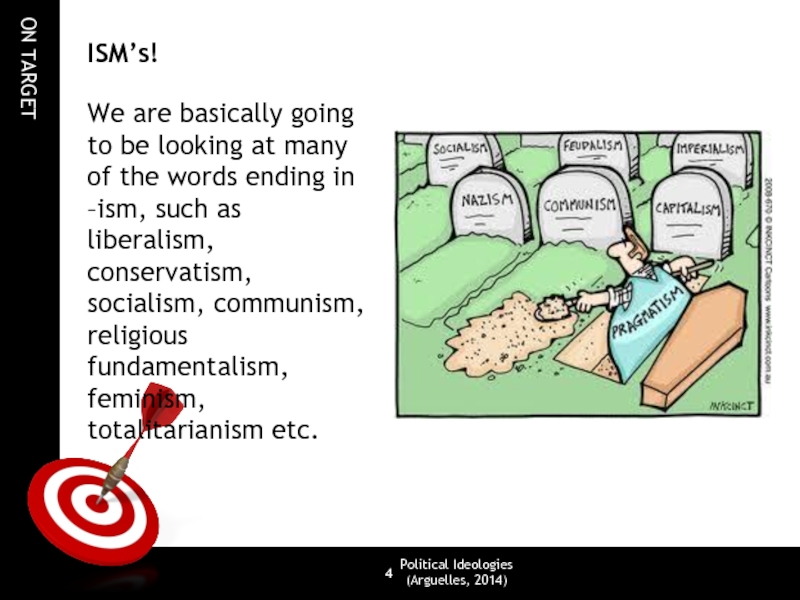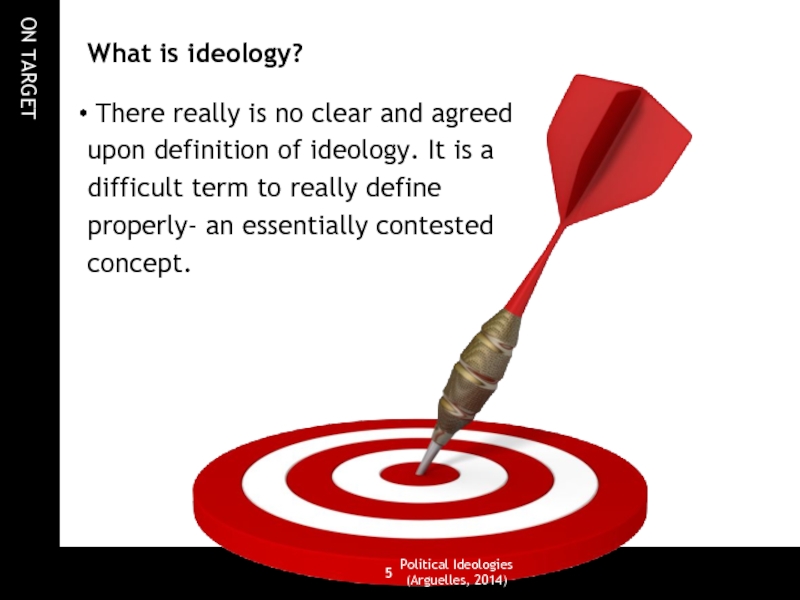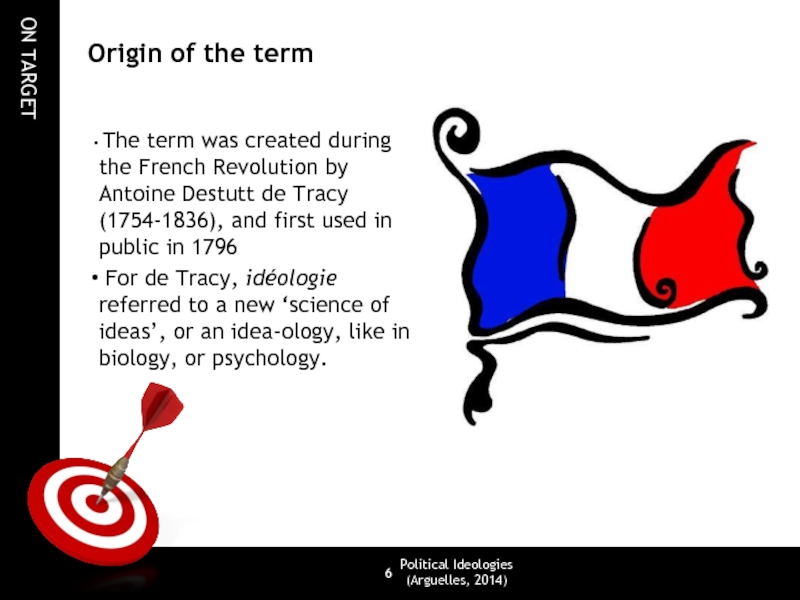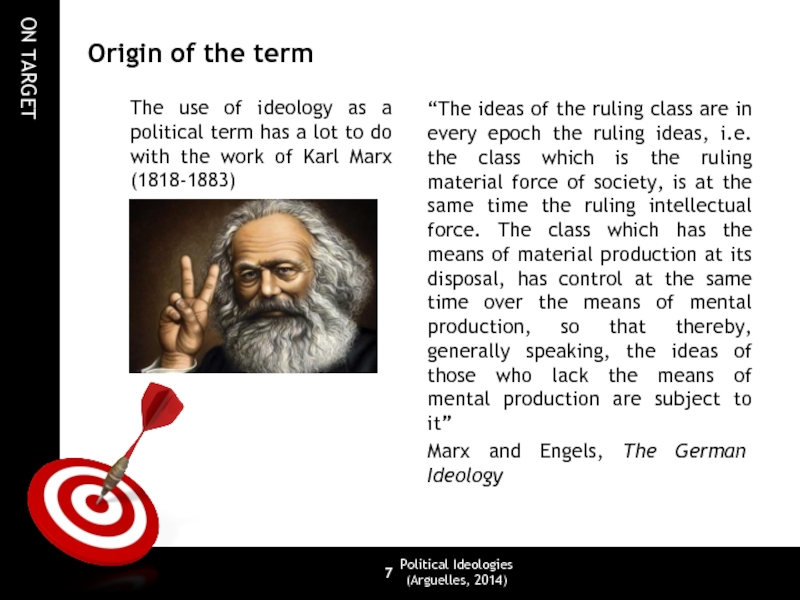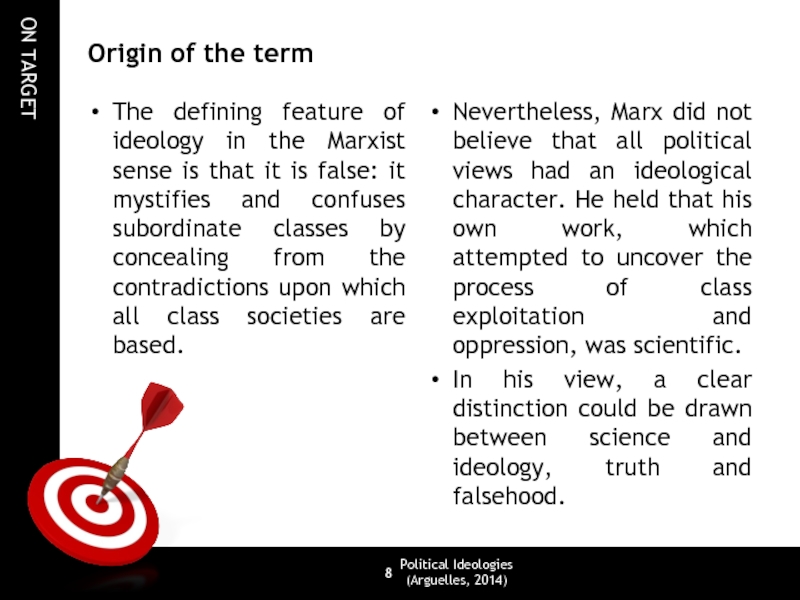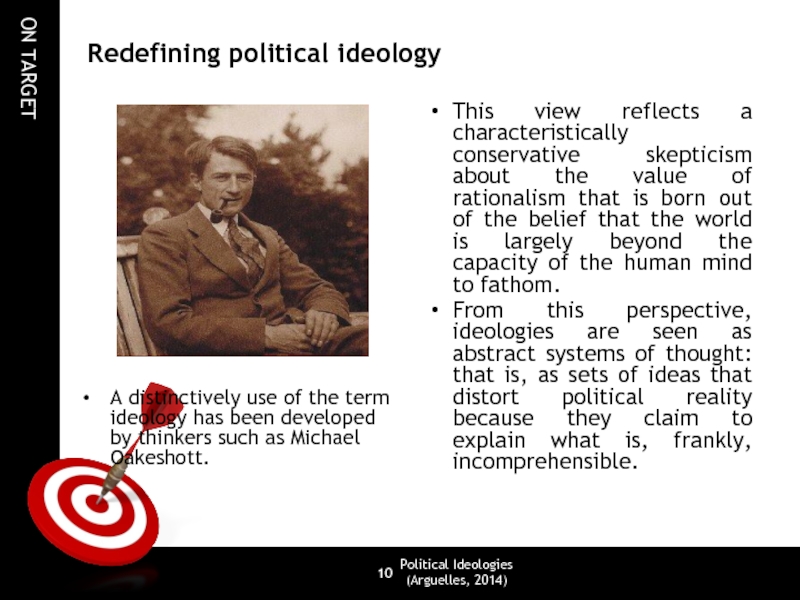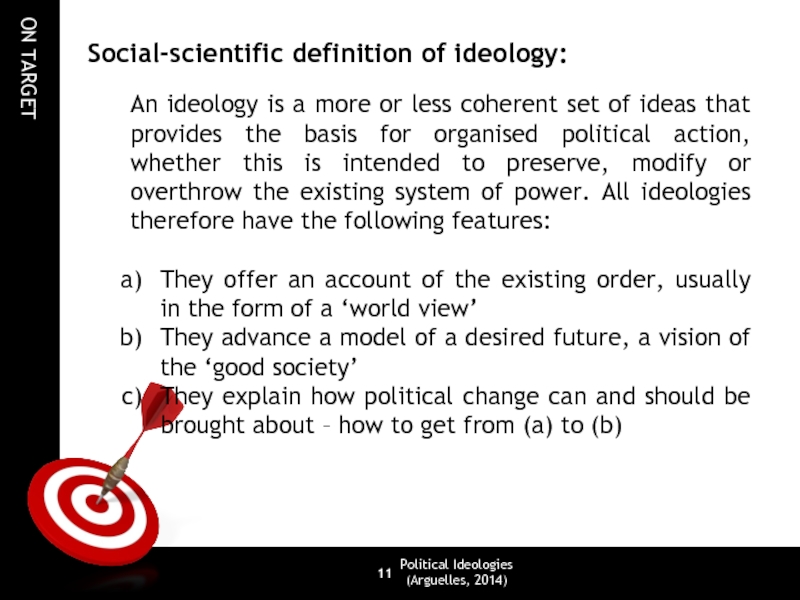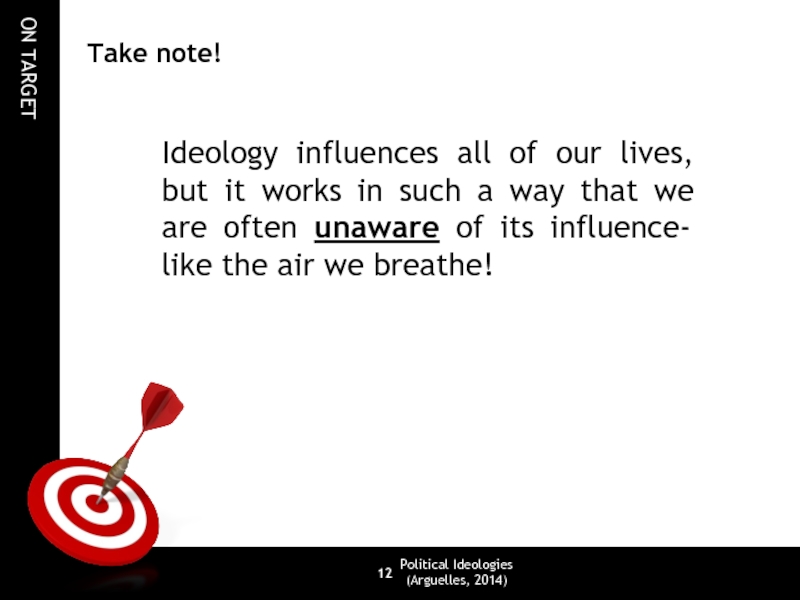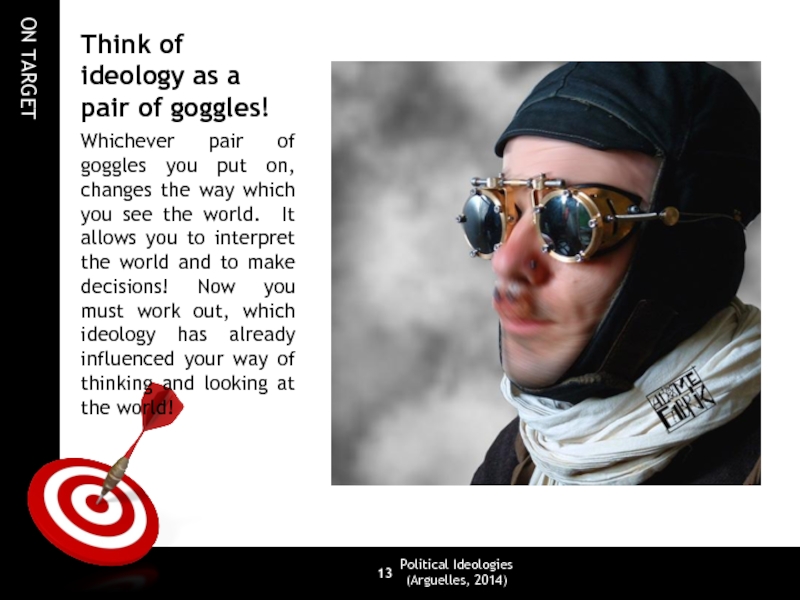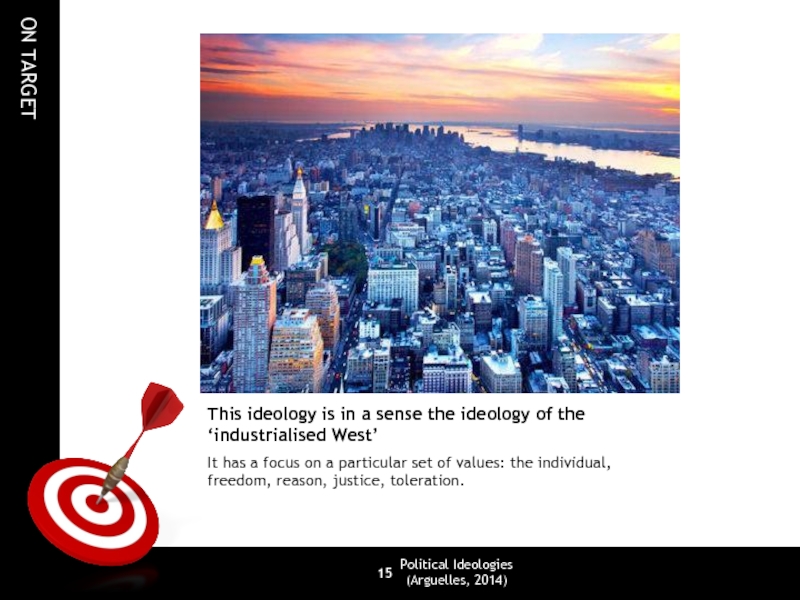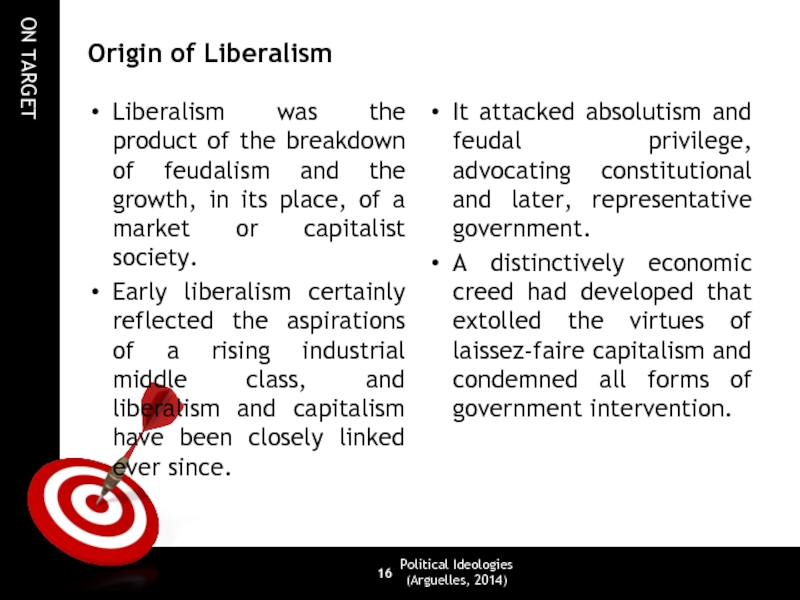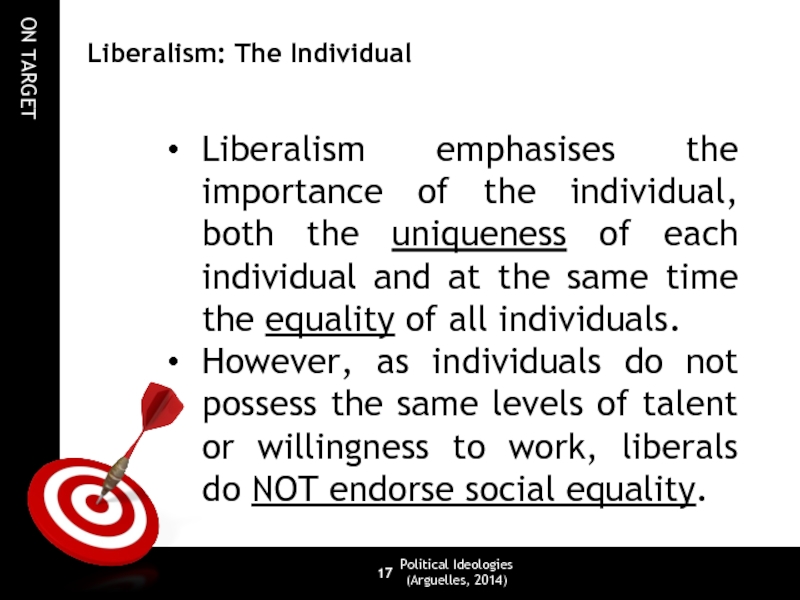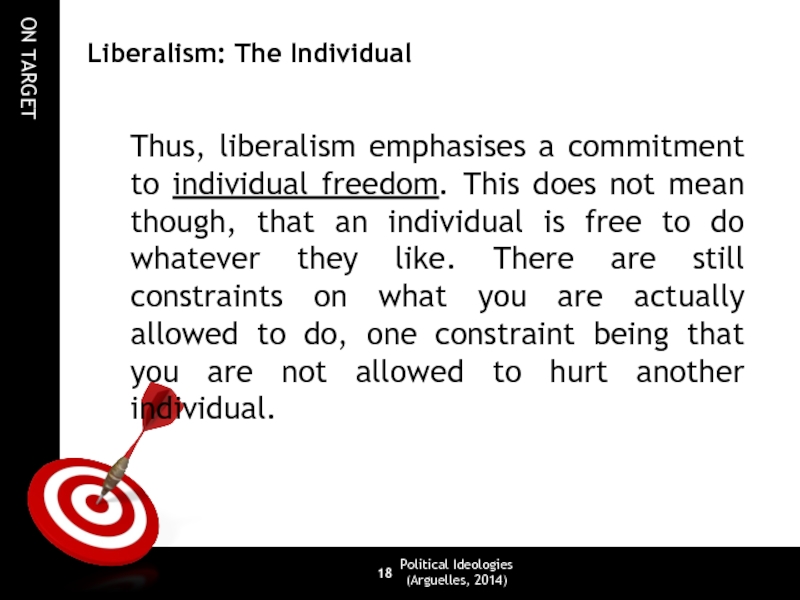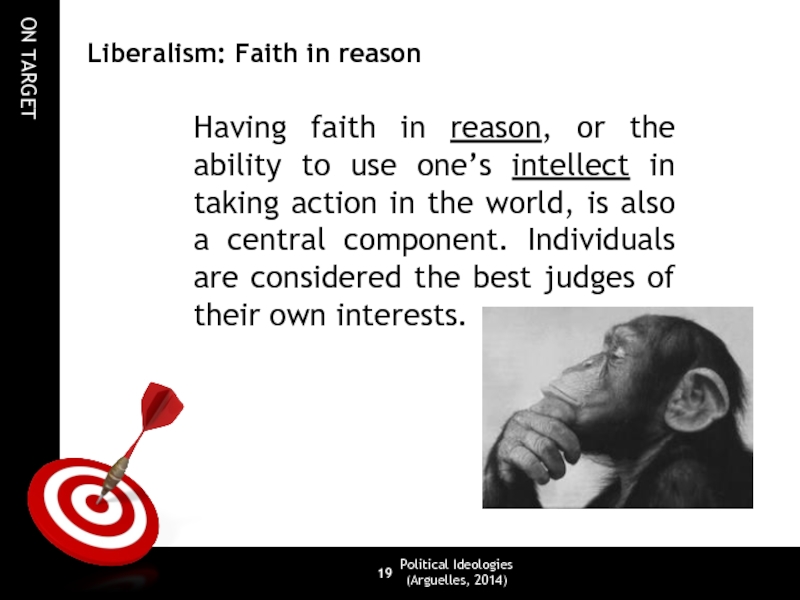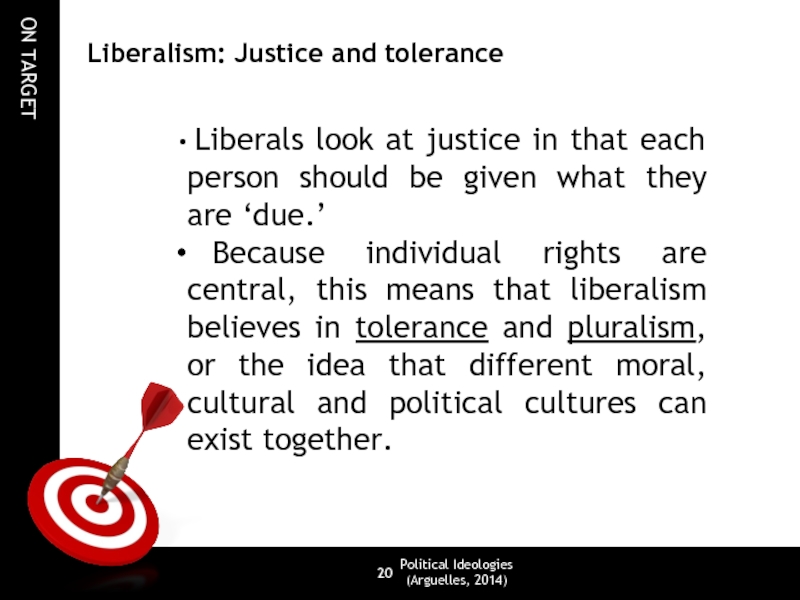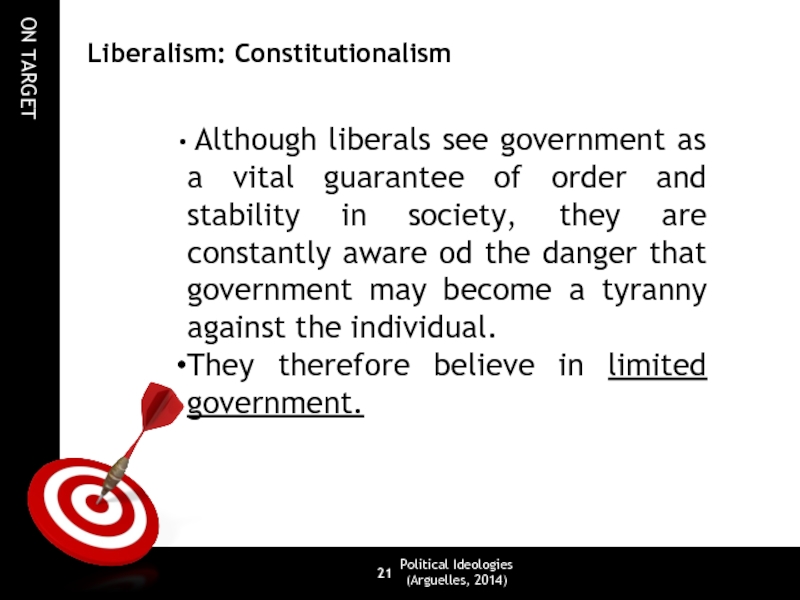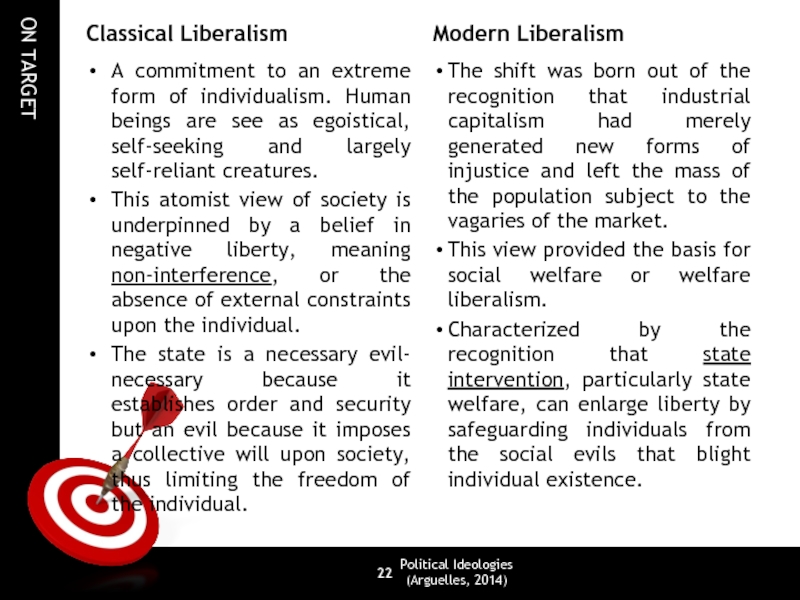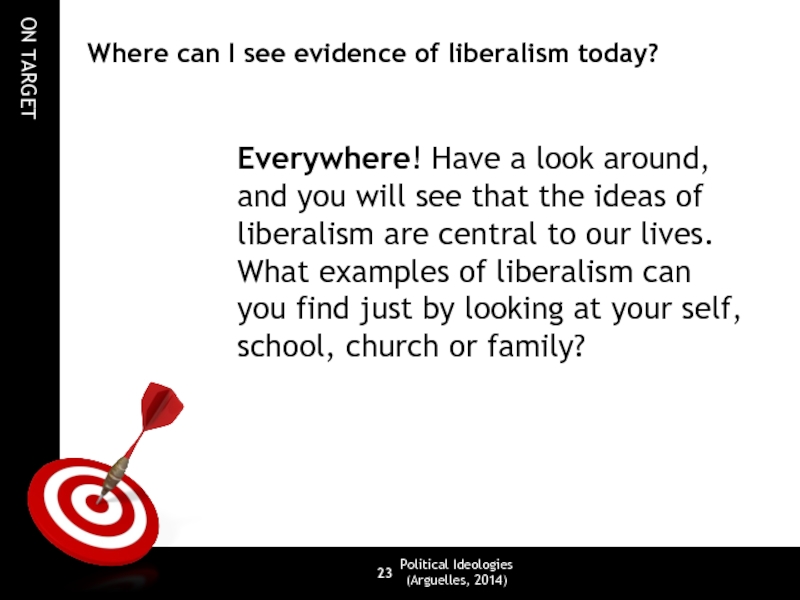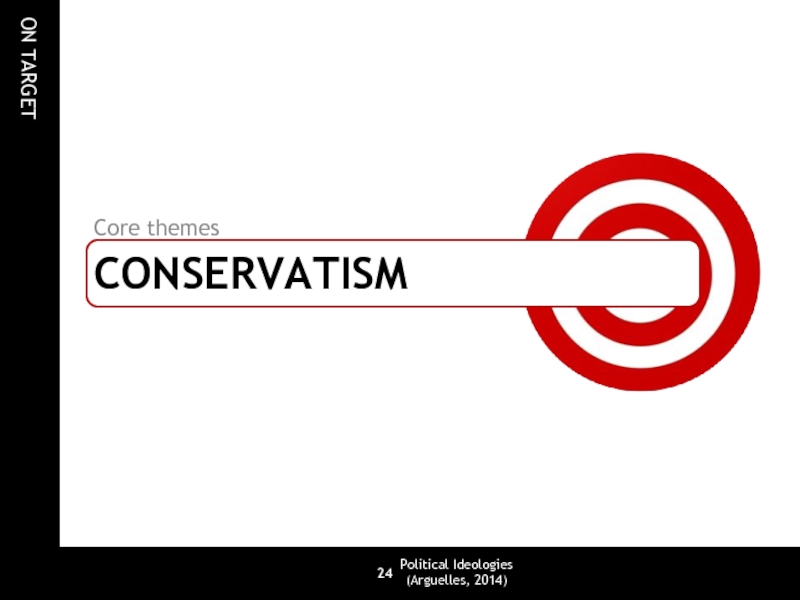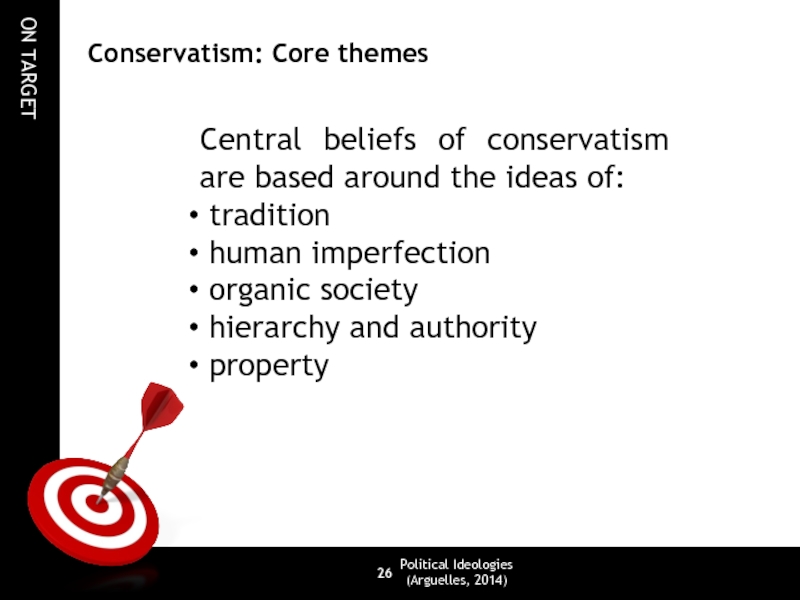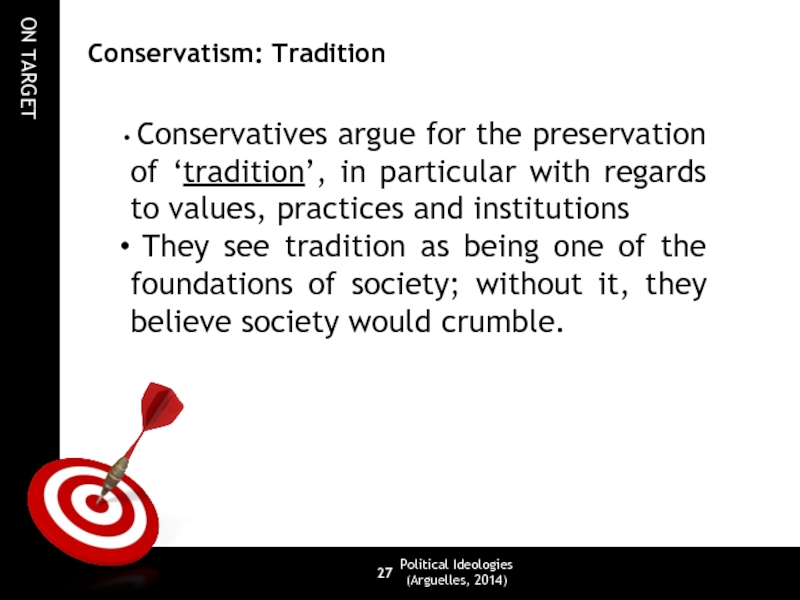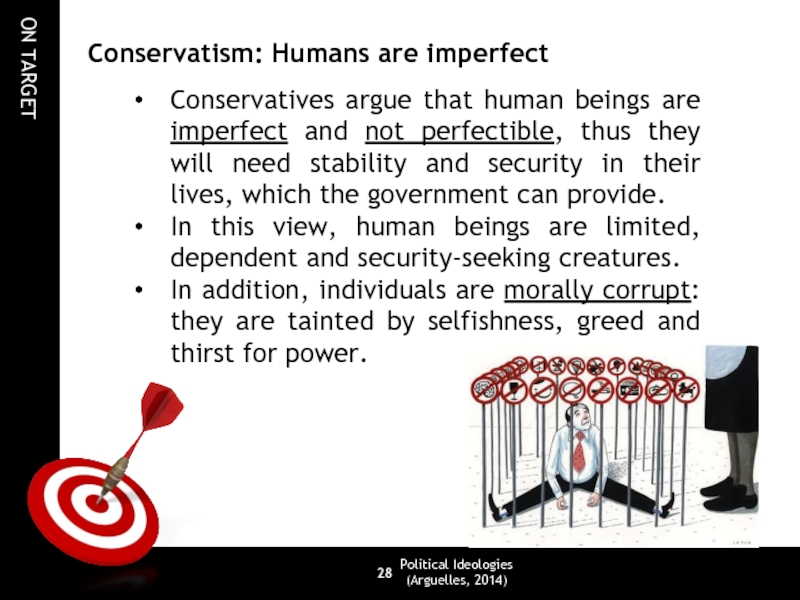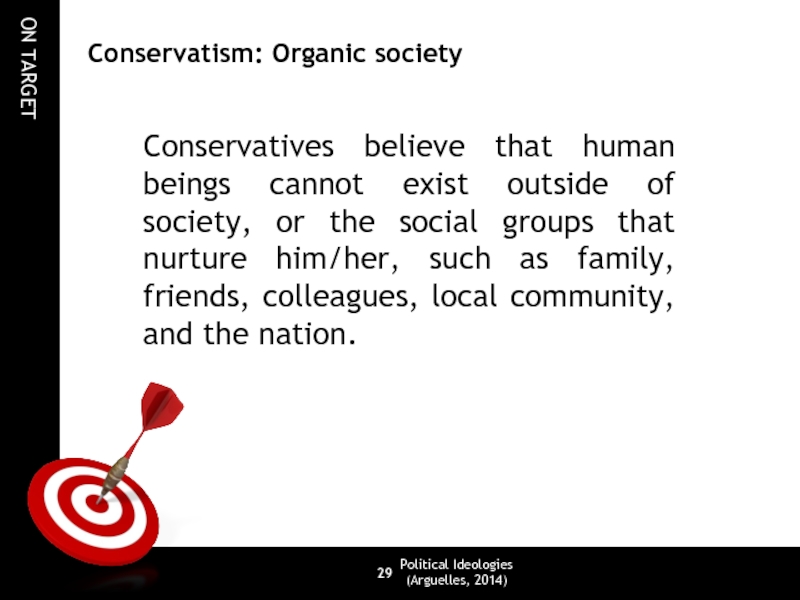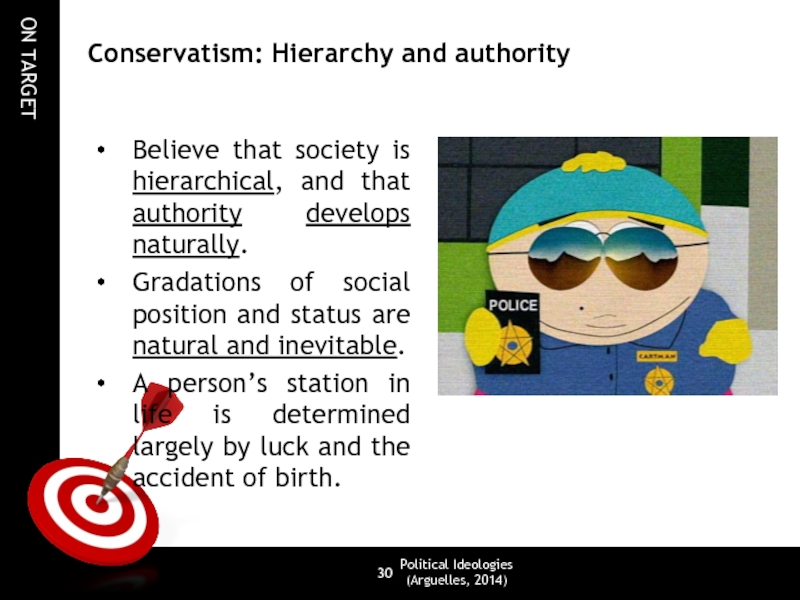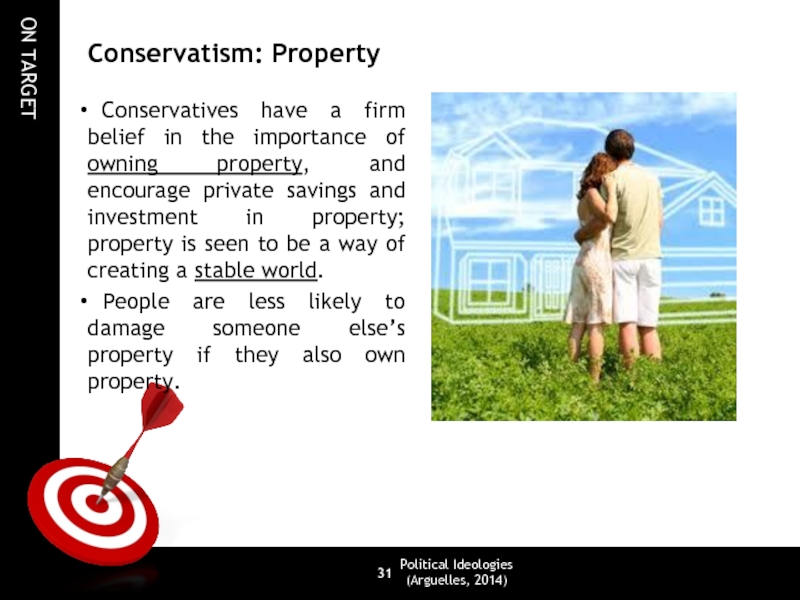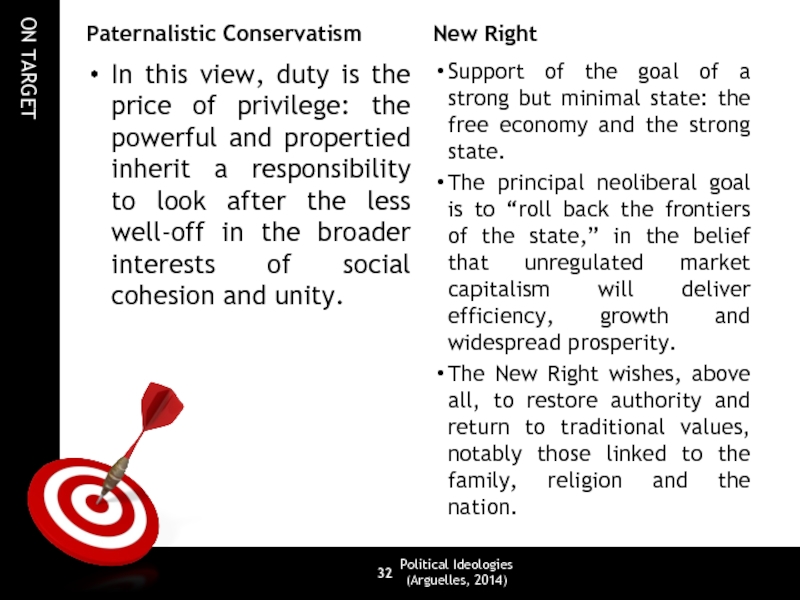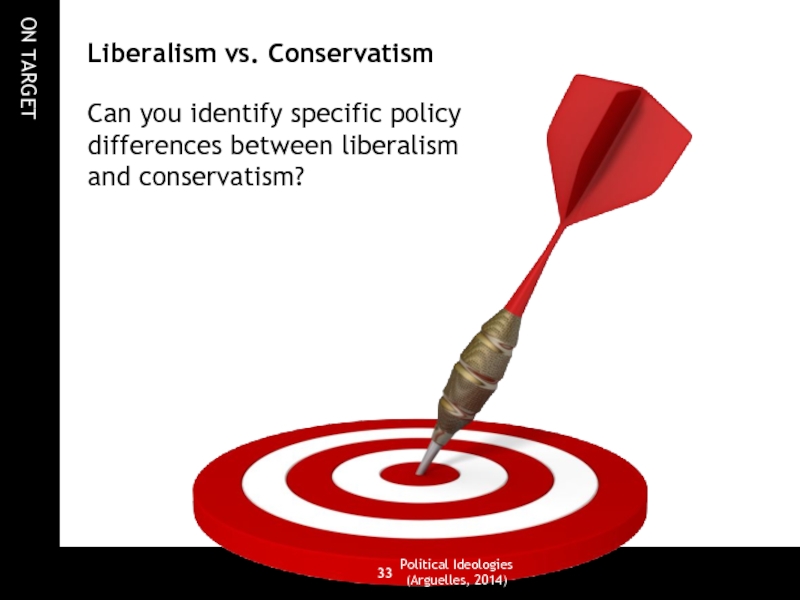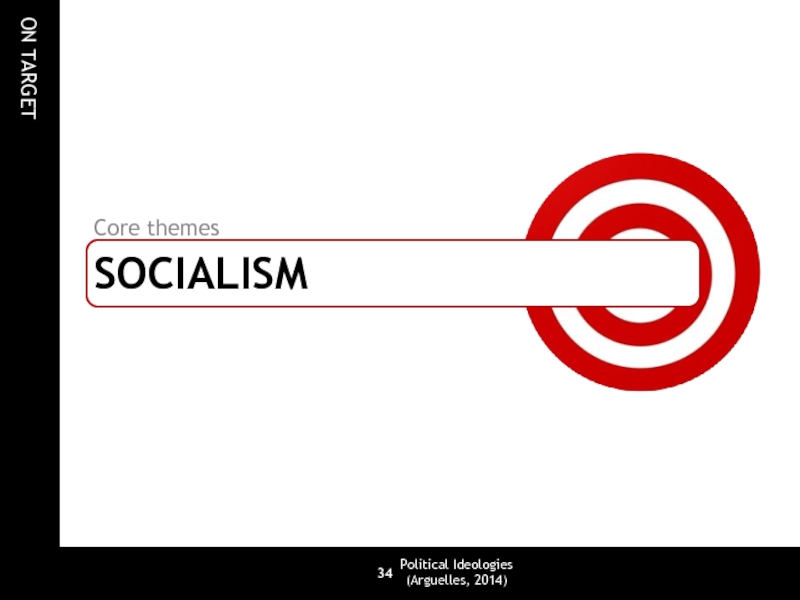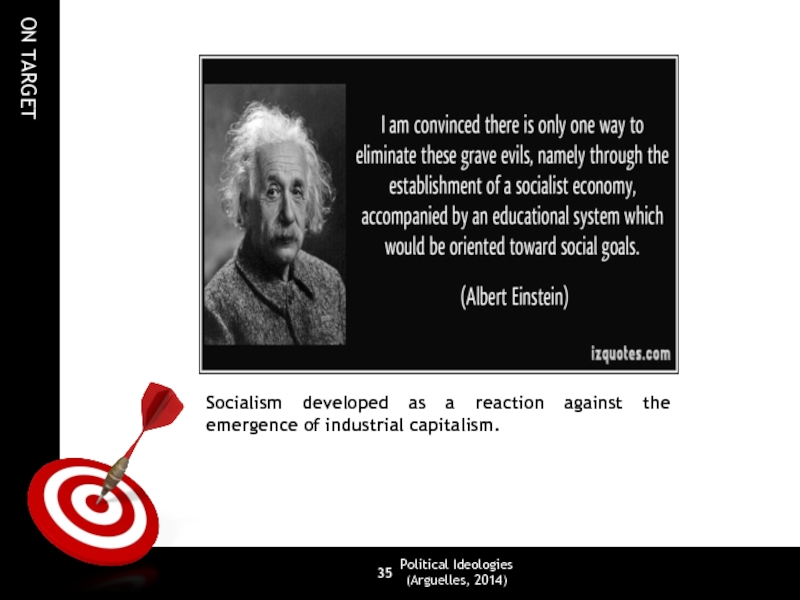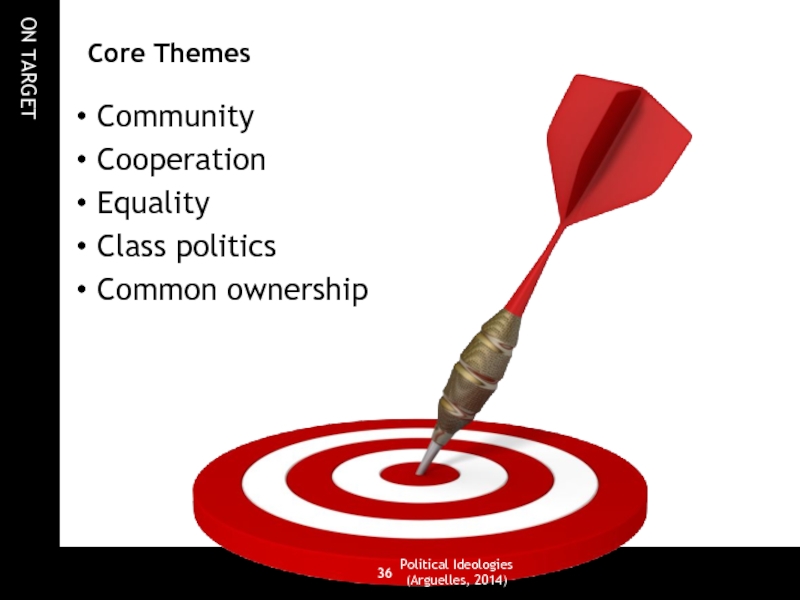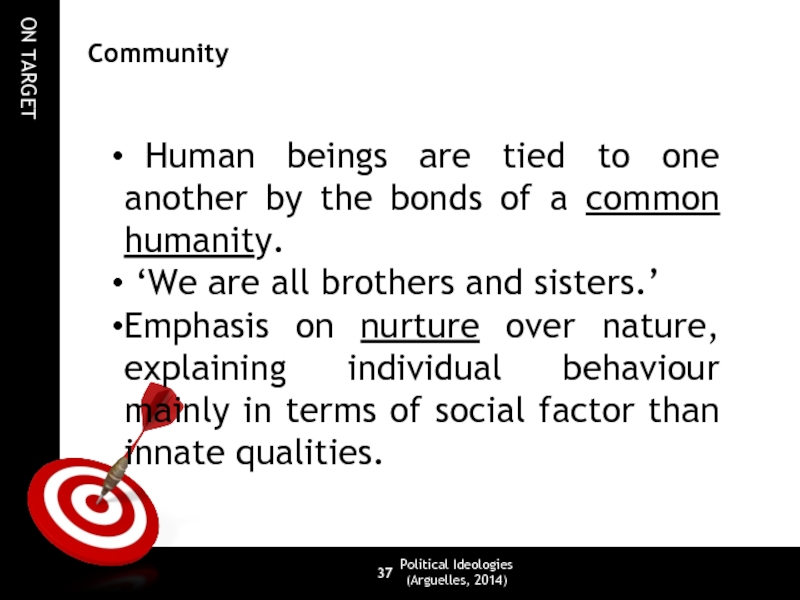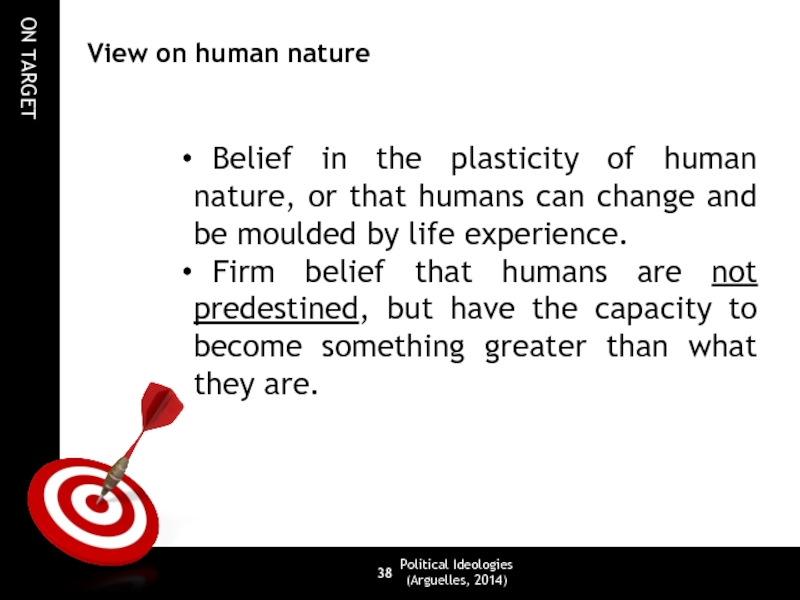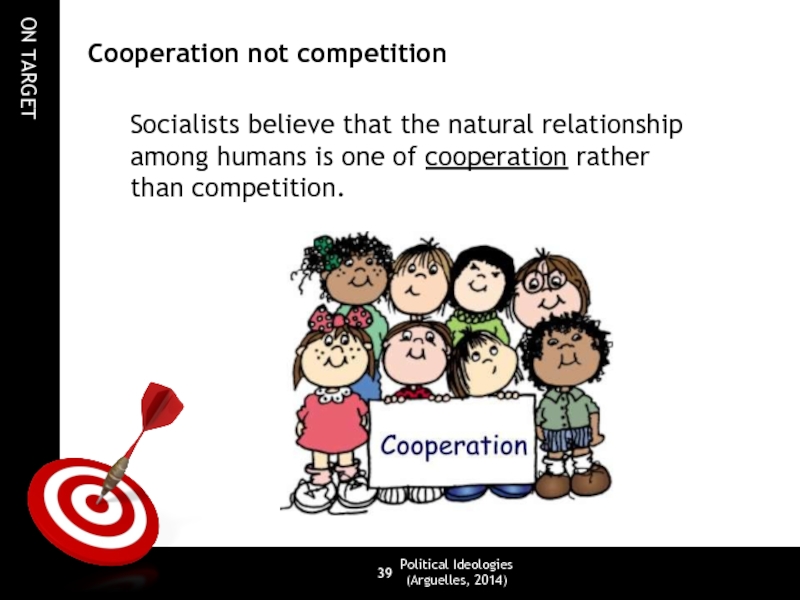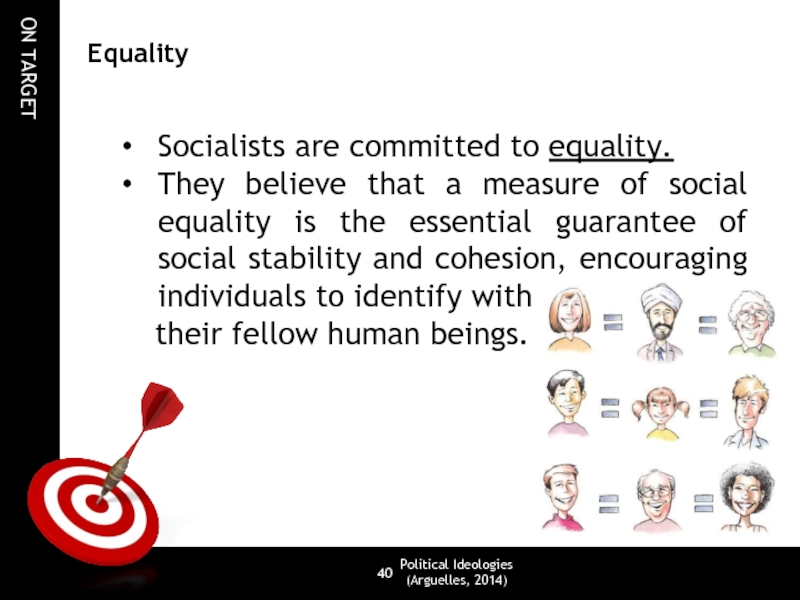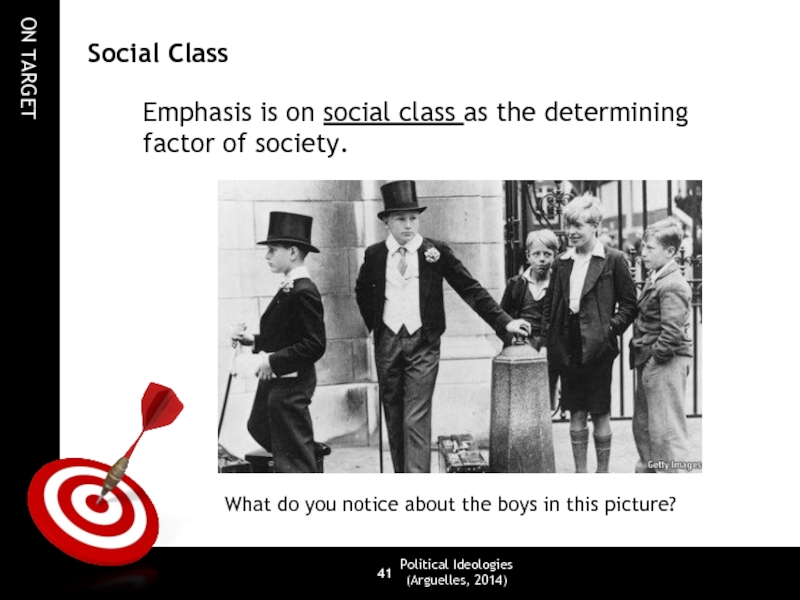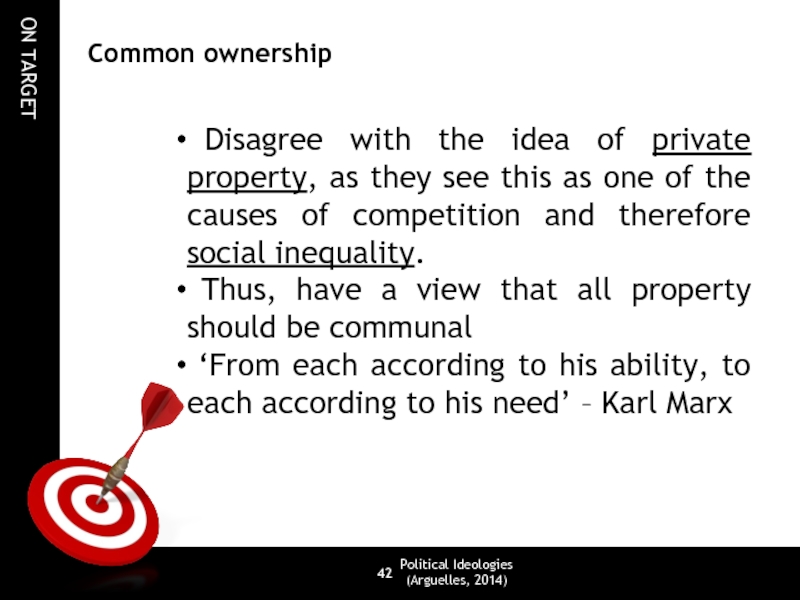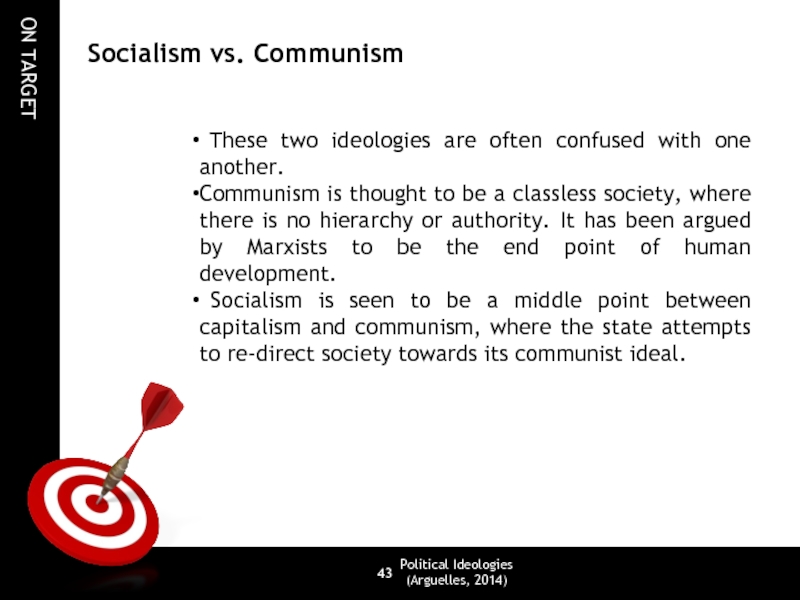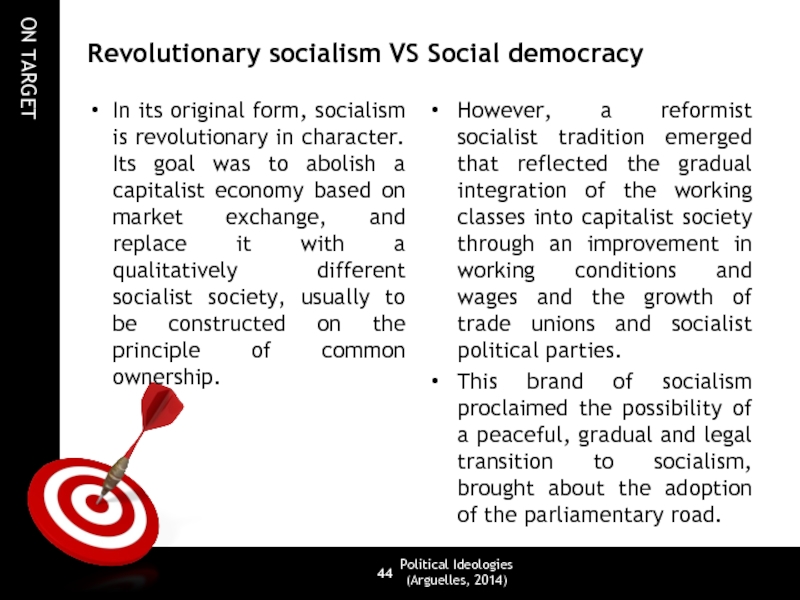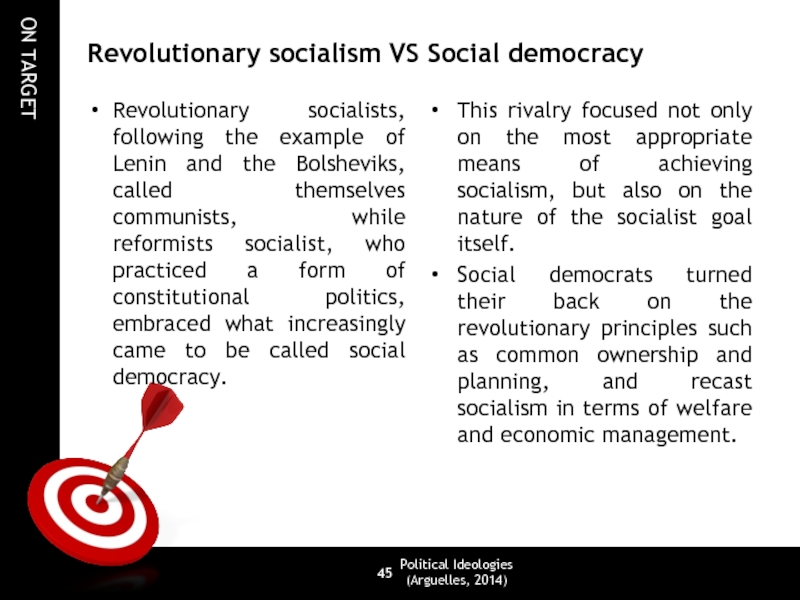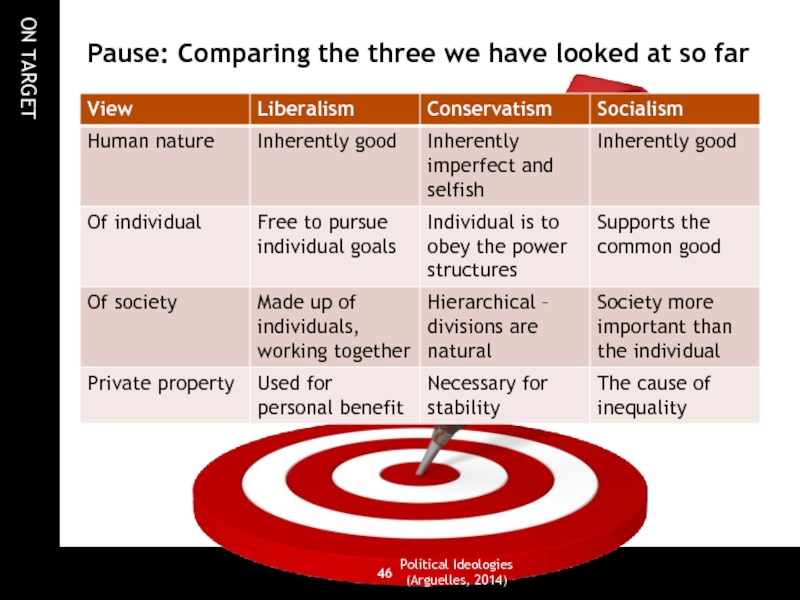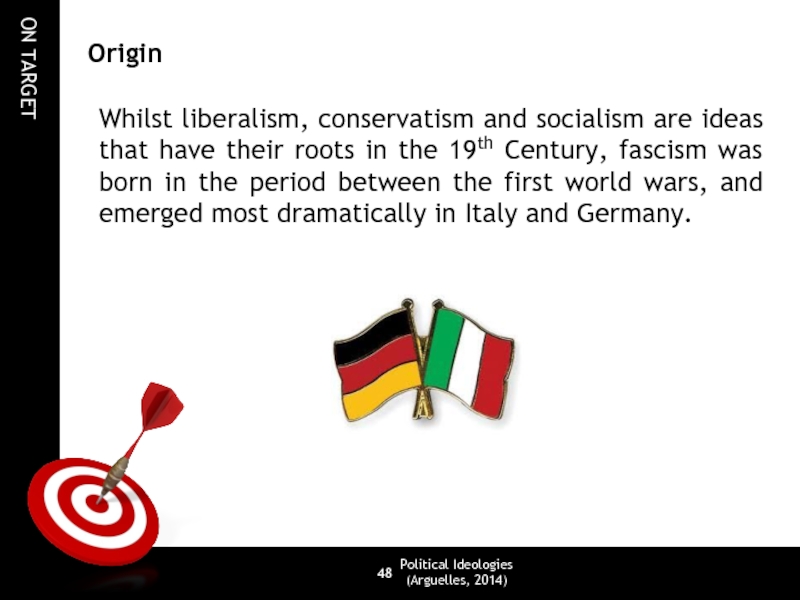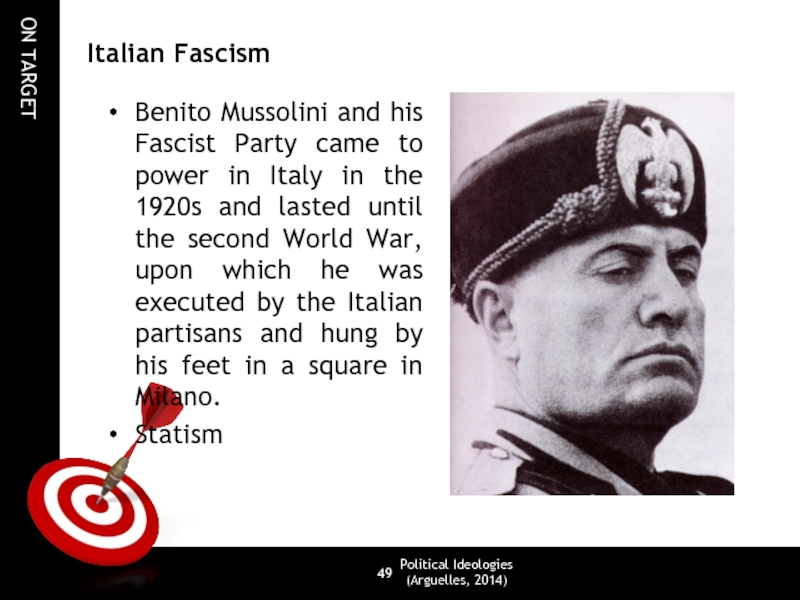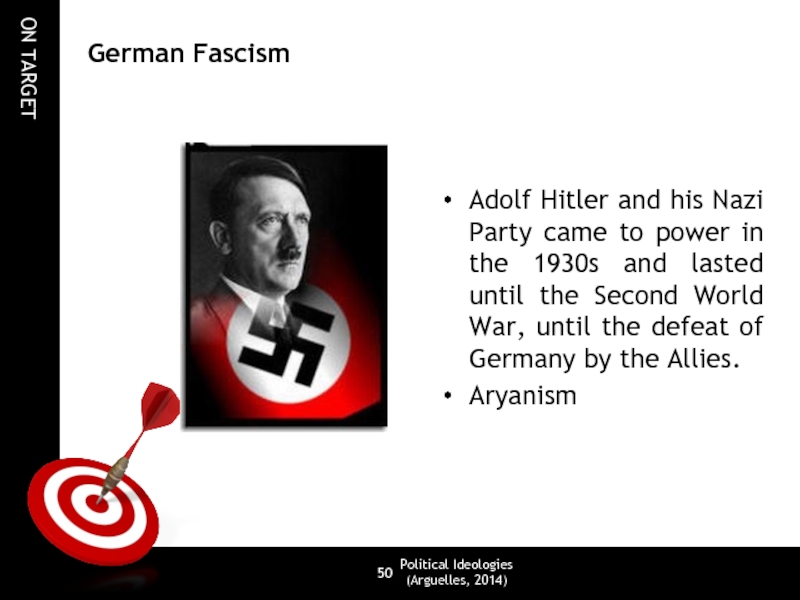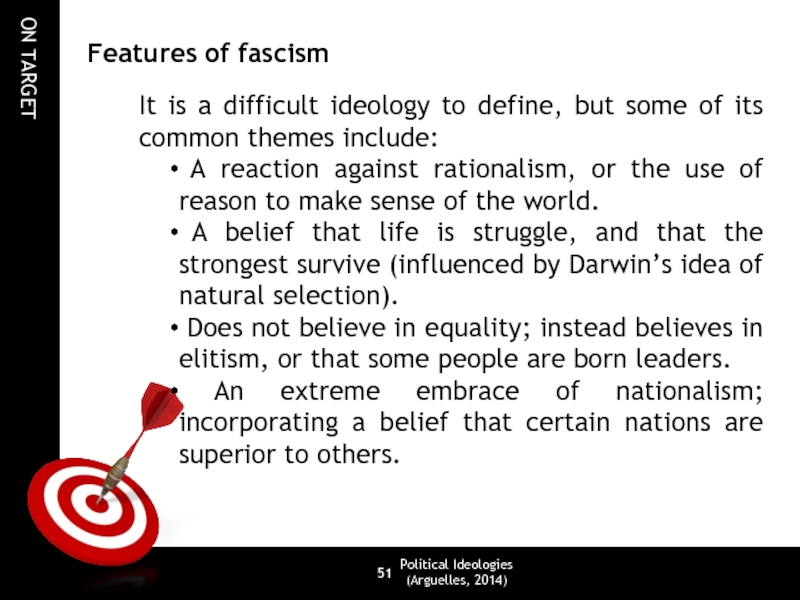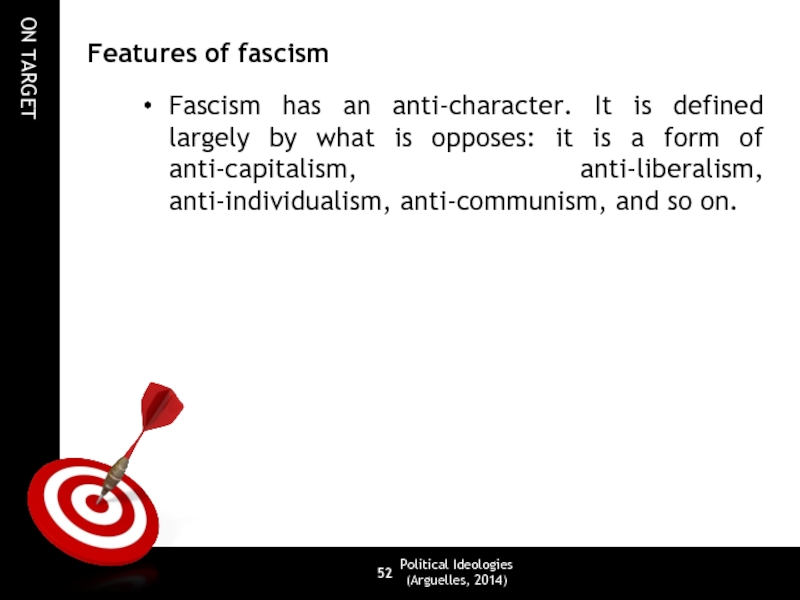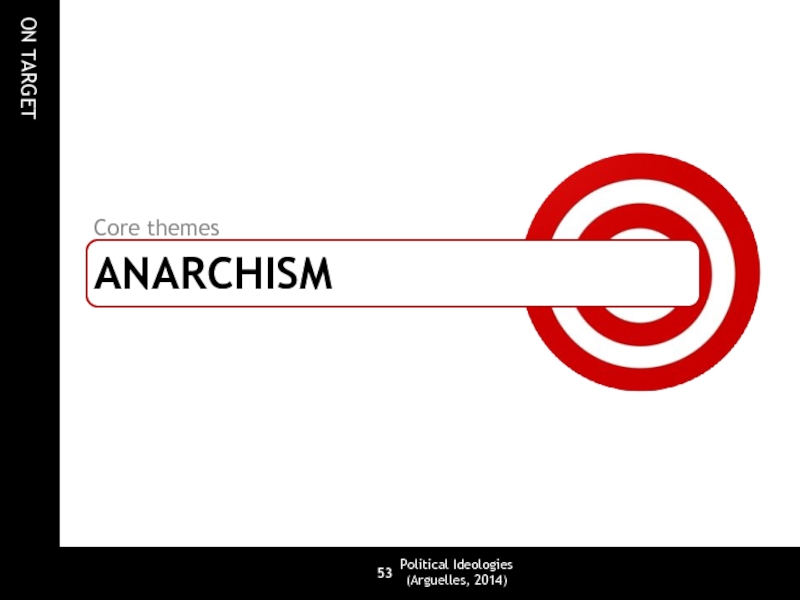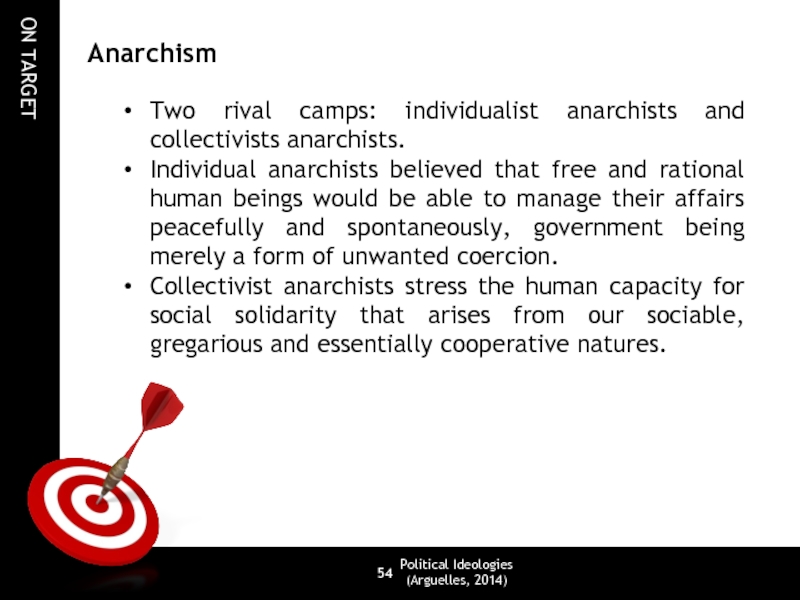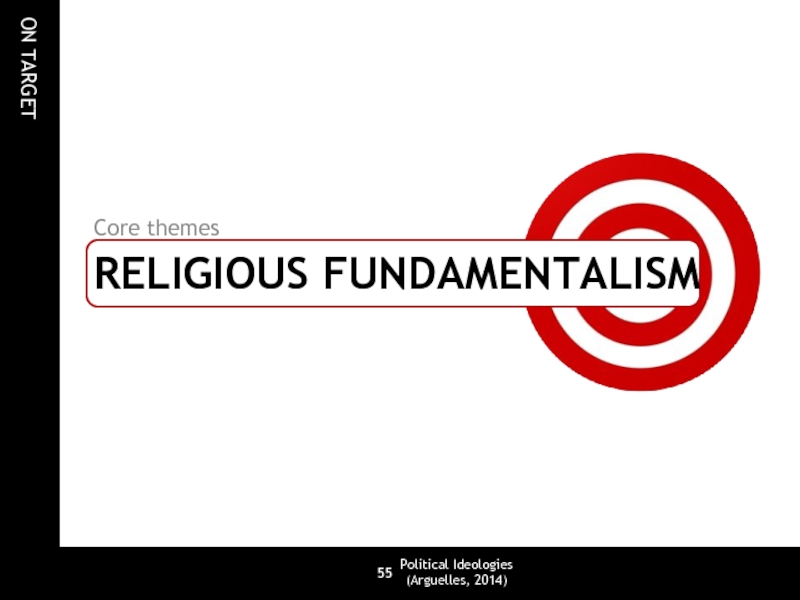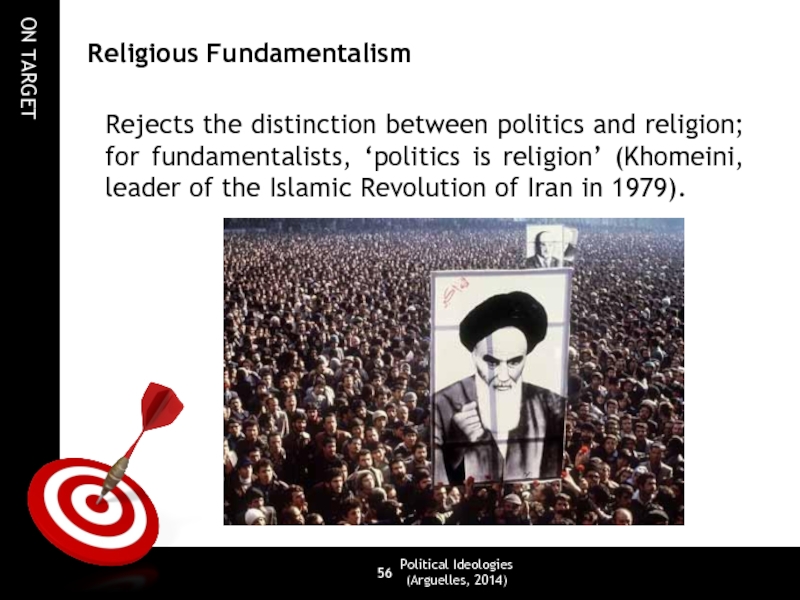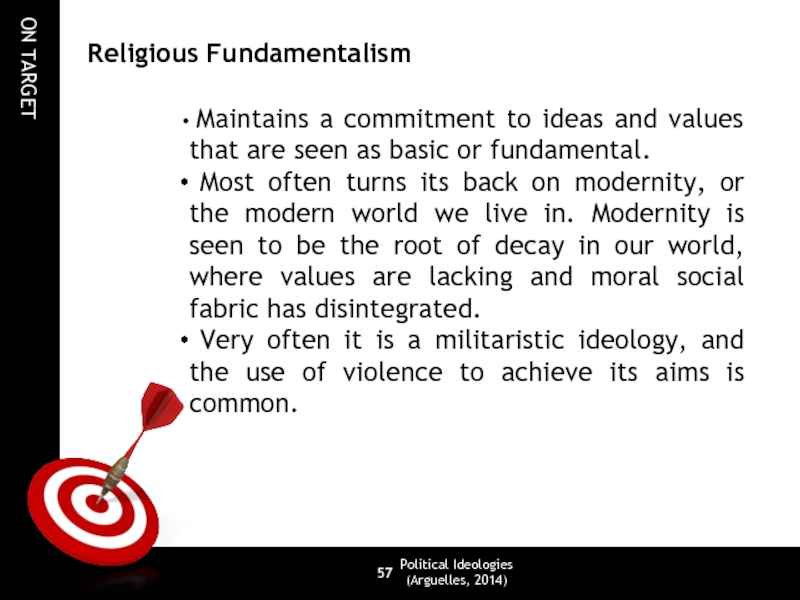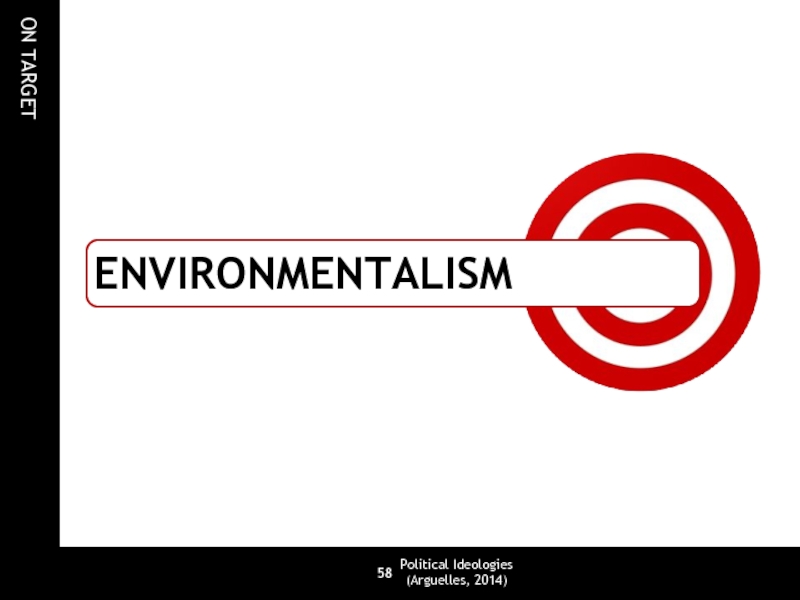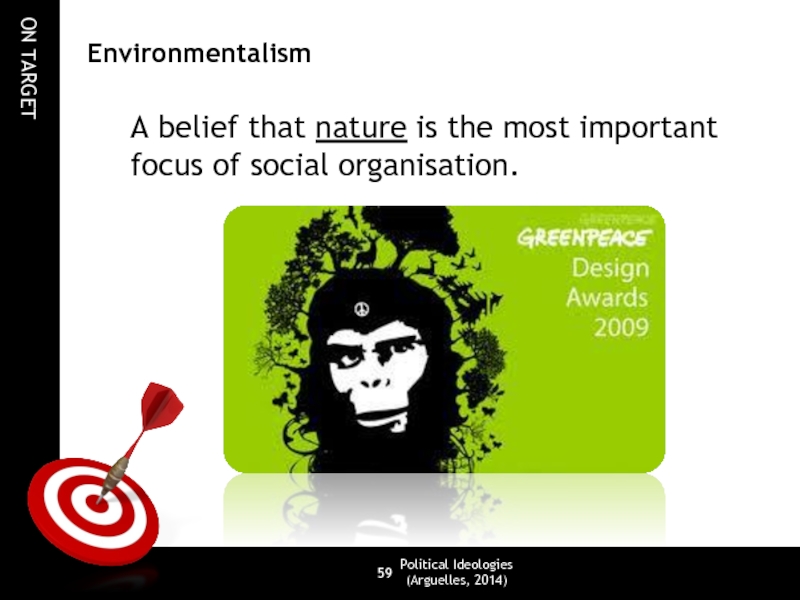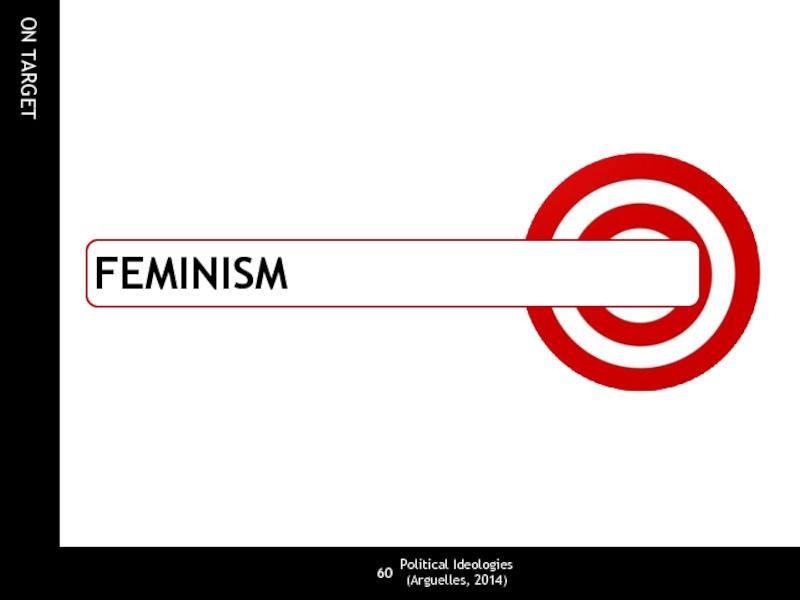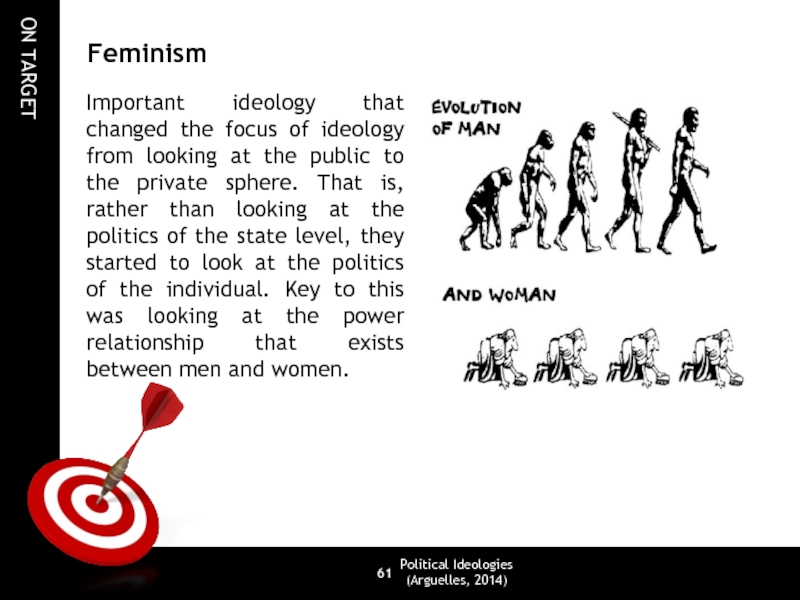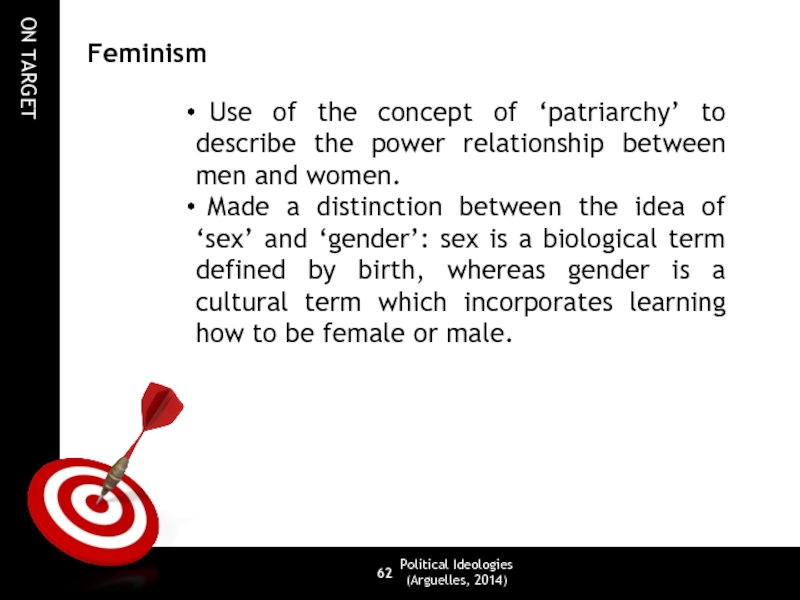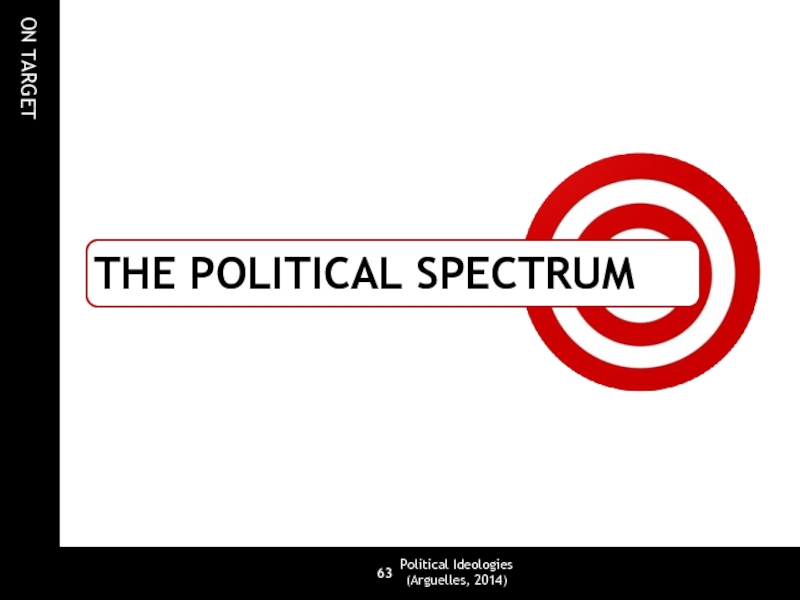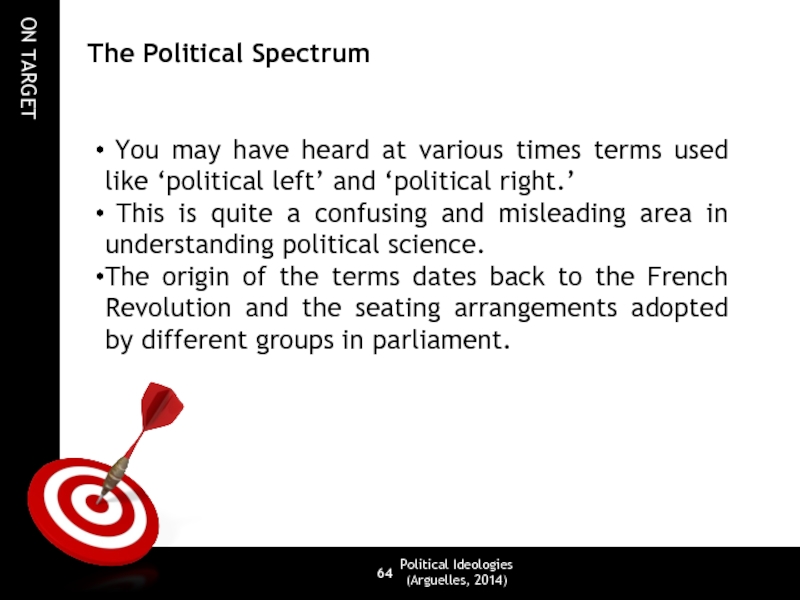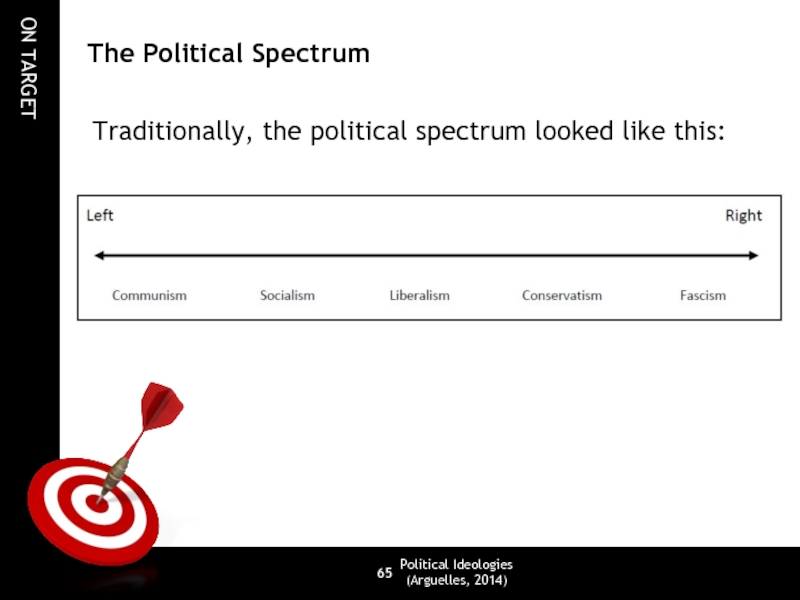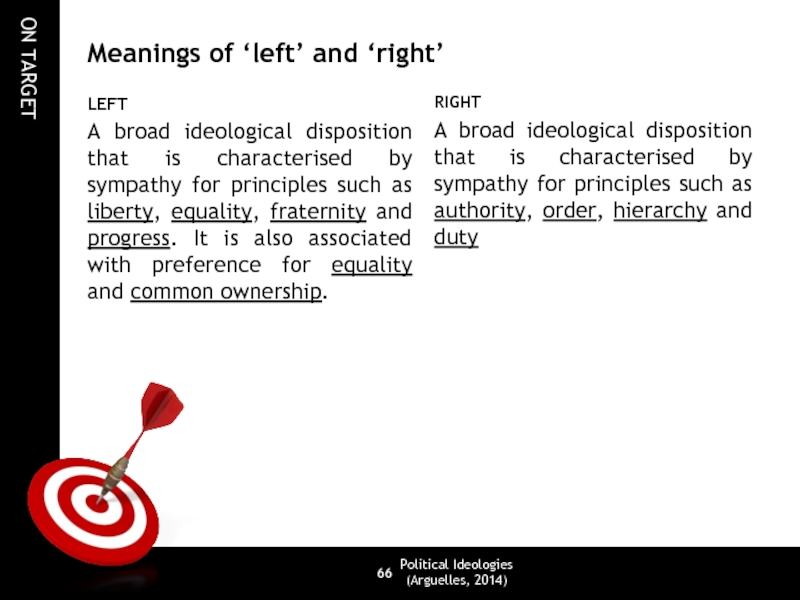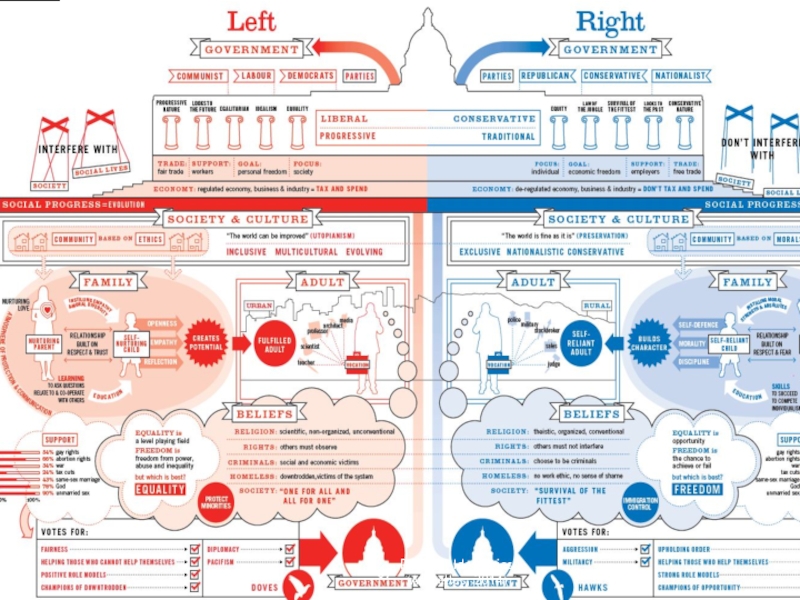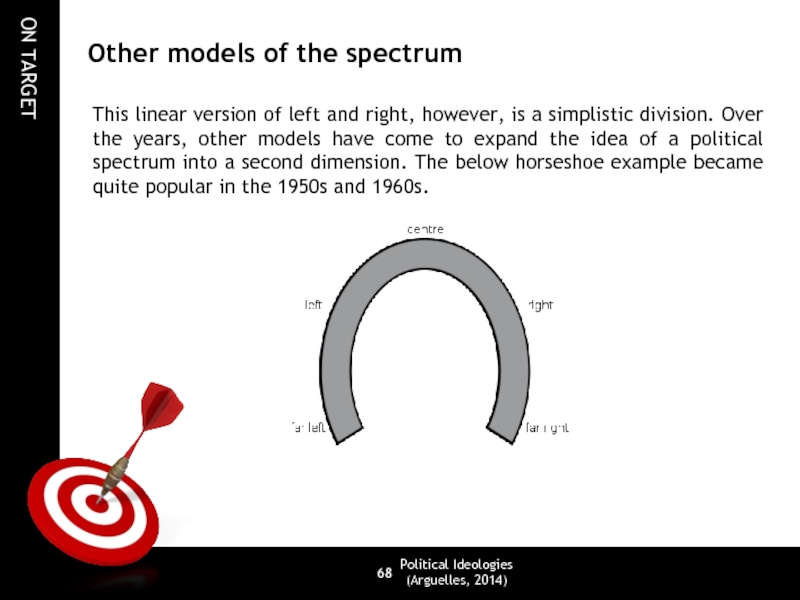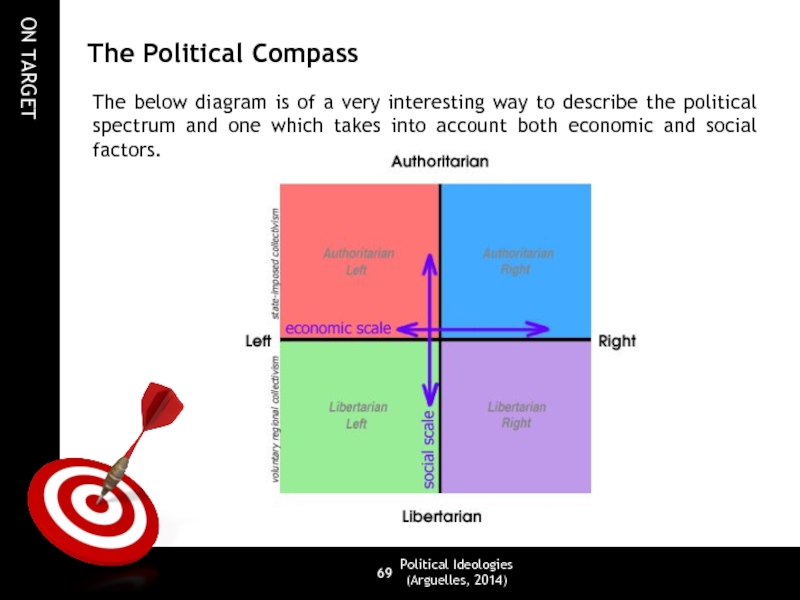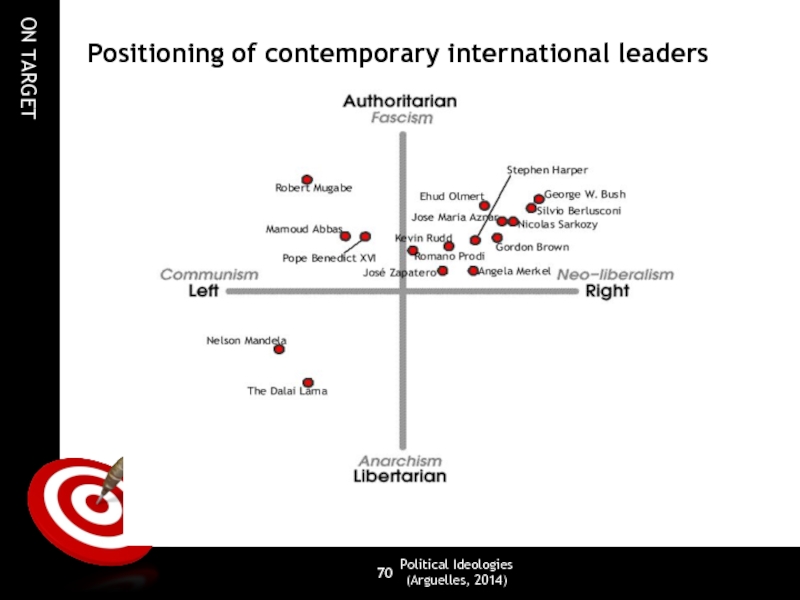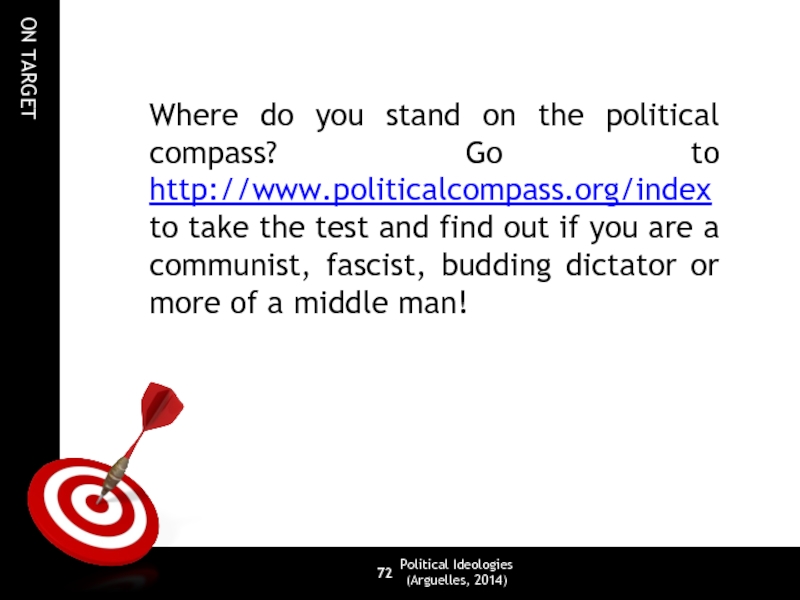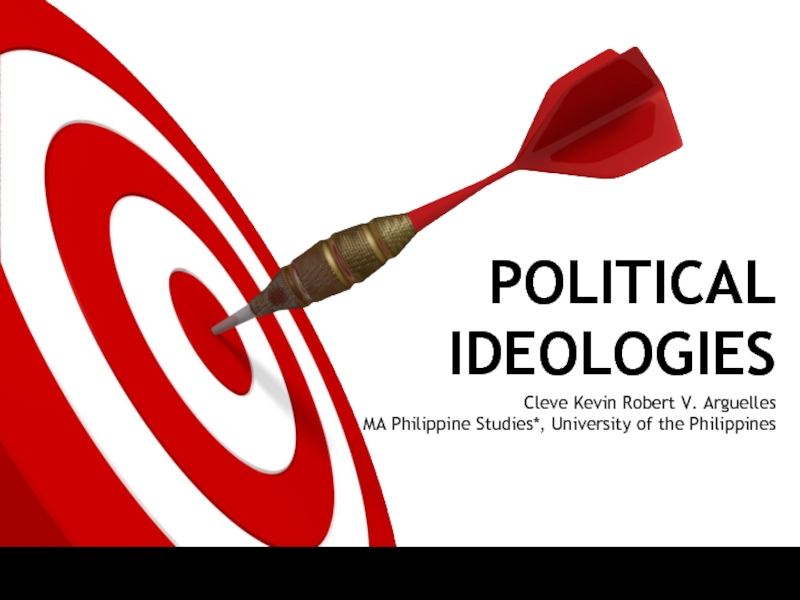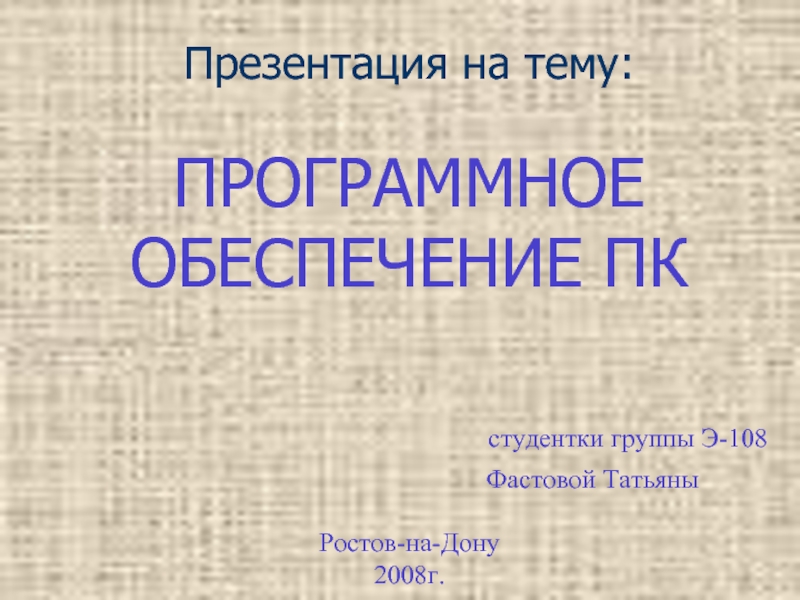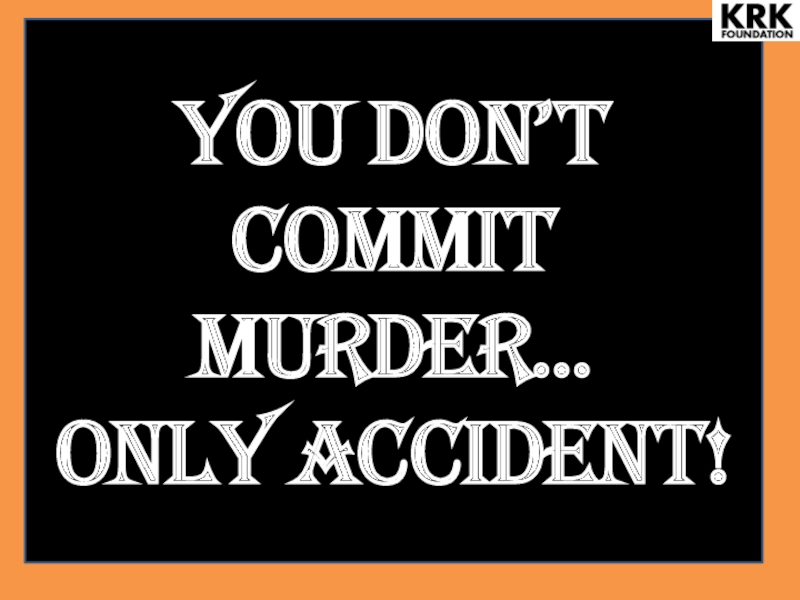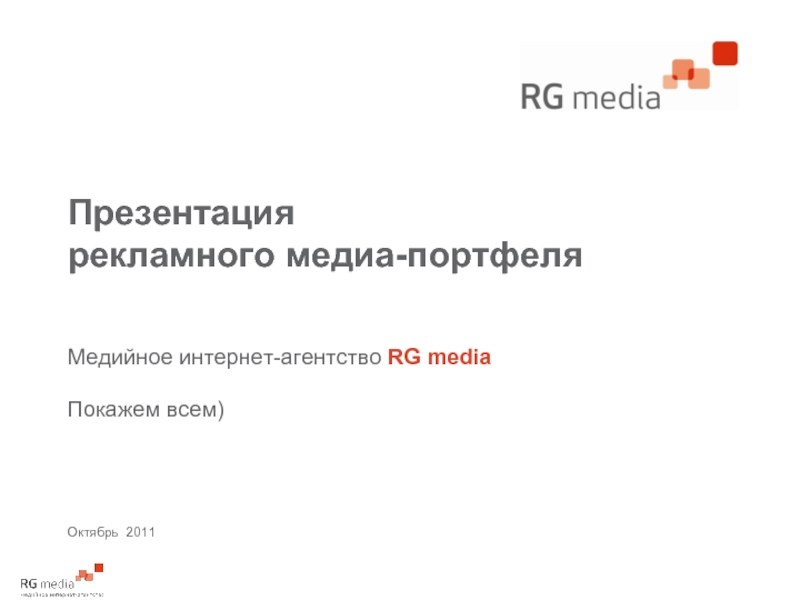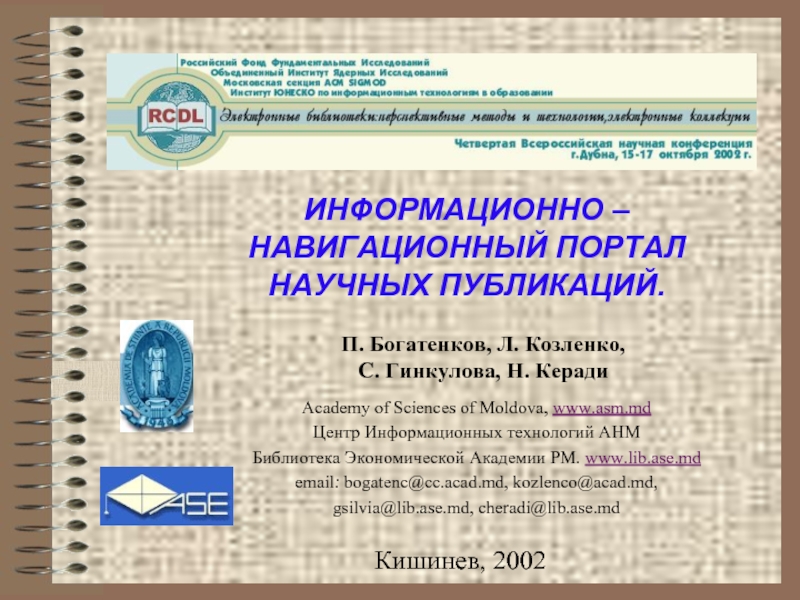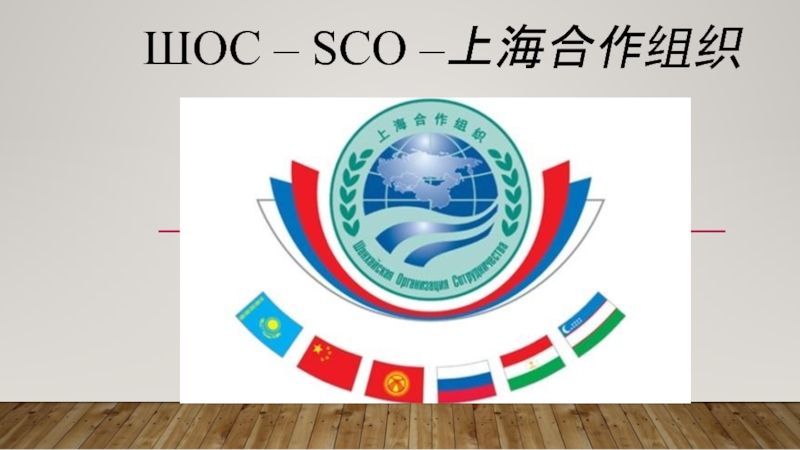Political Ideologies (Arguelles, 2014)
- Главная
- Разное
- Дизайн
- Бизнес и предпринимательство
- Аналитика
- Образование
- Развлечения
- Красота и здоровье
- Финансы
- Государство
- Путешествия
- Спорт
- Недвижимость
- Армия
- Графика
- Культурология
- Еда и кулинария
- Лингвистика
- Английский язык
- Астрономия
- Алгебра
- Биология
- География
- Детские презентации
- Информатика
- История
- Литература
- Маркетинг
- Математика
- Медицина
- Менеджмент
- Музыка
- МХК
- Немецкий язык
- ОБЖ
- Обществознание
- Окружающий мир
- Педагогика
- Русский язык
- Технология
- Физика
- Философия
- Химия
- Шаблоны, картинки для презентаций
- Экология
- Экономика
- Юриспруденция
POLITICAL IDEOLOGIES презентация
Содержание
- 1. POLITICAL IDEOLOGIES
- 2. LEARNING OUTLINE Understanding “ideology” Core
- 3. WHAT IS “IDEOLOGY”? Political Ideologies (Arguelles, 2014)
- 4. ISM’s! We are basically going to be
- 5. What is ideology? There really is
- 6. Origin of the term The term
- 7. Origin of the term “The ideas of
- 8. Origin of the term The defining feature
- 9. Redefining political ideology The emergence of totalitarian
- 10. Redefining political ideology A distinctively use of
- 11. Social-scientific definition of ideology: An ideology is
- 12. Take note! Ideology influences all of our
- 13. Think of ideology as a pair of
- 14. LIBERALISM Core themes Political Ideologies (Arguelles, 2014)
- 15. This ideology is in a sense the
- 16. Origin of Liberalism Liberalism was the product
- 17. Liberalism: The Individual Liberalism emphasises the importance
- 18. Liberalism: The Individual Thus, liberalism emphasises a
- 19. Liberalism: Faith in reason Having faith in
- 20. Liberalism: Justice and tolerance Liberals look
- 21. Liberalism: Constitutionalism Although liberals see government
- 22. Classical Liberalism A commitment to an extreme
- 23. Where can I see evidence of liberalism
- 24. CONSERVATISM Core themes Political Ideologies (Arguelles, 2014)
- 25. In trying to resist the pressures unleashed
- 26. Conservatism: Core themes Central beliefs of conservatism
- 27. Conservatism: Tradition Conservatives argue for the
- 28. Conservatism: Humans are imperfect Conservatives argue that
- 29. Conservatism: Organic society Conservatives believe that human
- 30. Conservatism: Hierarchy and authority Believe that society
- 31. Conservatism: Property Conservatives have a firm
- 32. Paternalistic Conservatism In this view, duty is
- 33. Liberalism vs. Conservatism Can you identify specific
- 34. SOCIALISM Core themes Political Ideologies (Arguelles, 2014)
- 35. Socialism developed as a reaction against the emergence of industrial capitalism. Political Ideologies (Arguelles, 2014)
- 36. Core Themes Community Cooperation
- 37. Community Human beings are tied to
- 38. View on human nature Belief in
- 39. Cooperation not competition Socialists believe that the
- 40. Equality Socialists are committed to equality. They
- 41. Social Class Emphasis is on social class
- 42. Common ownership Disagree with the idea
- 43. Socialism vs. Communism These two
- 44. Revolutionary socialism VS Social democracy In its
- 45. Revolutionary socialism VS Social democracy Revolutionary socialists,
- 46. Pause: Comparing the three we have looked at so far Political Ideologies (Arguelles, 2014)
- 47. FASCISM Core themes Political Ideologies (Arguelles, 2014)
- 48. Origin Whilst liberalism, conservatism and socialism are
- 49. Italian Fascism Benito Mussolini and his Fascist
- 50. German Fascism Adolf Hitler and his Nazi
- 51. Features of fascism It is a difficult
- 52. Features of fascism Fascism has an anti-character.
- 53. ANARCHISM Core themes Political Ideologies (Arguelles, 2014)
- 54. Anarchism Two rival camps: individualist anarchists and
- 55. RELIGIOUS FUNDAMENTALISM Core themes Political Ideologies (Arguelles, 2014)
- 56. Religious Fundamentalism Rejects the distinction between politics
- 57. Religious Fundamentalism Maintains a commitment to
- 58. ENVIRONMENTALISM Political Ideologies (Arguelles, 2014)
- 59. Environmentalism A belief that nature is the
- 60. FEMINISM Political Ideologies (Arguelles, 2014)
- 61. Feminism Important ideology that changed the focus
- 62. Feminism Use of the concept of
- 63. THE POLITICAL SPECTRUM Political Ideologies (Arguelles, 2014)
- 64. The Political Spectrum You may have
- 65. The Political Spectrum Traditionally, the political spectrum looked like this: Political Ideologies (Arguelles, 2014)
- 66. Meanings of ‘left’ and ‘right’ LEFT A
- 67. Political Ideologies (Arguelles, 2014)
- 68. Other models of the spectrum This linear
- 69. The Political Compass The below diagram is
- 70. Positioning of contemporary international leaders Political Ideologies (Arguelles, 2014)
- 71. Traditional international leaders Political Ideologies (Arguelles, 2014)
- 72. Where do you stand on the political
- 73. POLITICAL IDEOLOGIES Cleve Kevin Robert V. Arguelles MA Philippine Studies*, University of the Philippines
Слайд 1POLITICAL IDEOLOGIES
Cleve Kevin Robert V. Arguelles,
MA Philippine Studies*, University of the
Слайд 2
LEARNING OUTLINE
Understanding “ideology”
Core themes of different ideologies
The political spectrum
Political Ideologies (Arguelles,
Слайд 4ISM’s!
We are basically going to be looking at many of the
Political Ideologies (Arguelles, 2014)
Слайд 5What is ideology?
There really is no clear and agreed
upon
difficult term to really define
properly- an essentially contested
concept.
Political Ideologies (Arguelles, 2014)
Слайд 6Origin of the term
The term was created during the French
For de Tracy, idéologie referred to a new ‘science of ideas’, or an idea-ology, like in biology, or psychology.
Political Ideologies (Arguelles, 2014)
Слайд 7Origin of the term
“The ideas of the ruling class are in
Marx and Engels, The German Ideology
The use of ideology as a political term has a lot to do with the work of Karl Marx (1818-1883)
Political Ideologies (Arguelles, 2014)
Слайд 8Origin of the term
The defining feature of ideology in the Marxist
Nevertheless, Marx did not believe that all political views had an ideological character. He held that his own work, which attempted to uncover the process of class exploitation and oppression, was scientific.
In his view, a clear distinction could be drawn between science and ideology, truth and falsehood.
Political Ideologies (Arguelles, 2014)
Слайд 9Redefining political ideology
The emergence of totalitarian dictatorships in the interwar period
Political Ideologies (Arguelles, 2014)
Слайд 10Redefining political ideology
A distinctively use of the term ideology has been
This view reflects a characteristically conservative skepticism about the value of rationalism that is born out of the belief that the world is largely beyond the capacity of the human mind to fathom.
From this perspective, ideologies are seen as abstract systems of thought: that is, as sets of ideas that distort political reality because they claim to explain what is, frankly, incomprehensible.
Political Ideologies (Arguelles, 2014)
Слайд 11Social-scientific definition of ideology:
An ideology is a more or less coherent
They offer an account of the existing order, usually in the form of a ‘world view’
They advance a model of a desired future, a vision of the ‘good society’
They explain how political change can and should be brought about – how to get from (a) to (b)
Political Ideologies (Arguelles, 2014)
Слайд 12Take note!
Ideology influences all of our lives, but it works in
Political Ideologies (Arguelles, 2014)
Слайд 13Think of ideology as a pair of goggles!
Whichever pair of goggles
Political Ideologies (Arguelles, 2014)
Слайд 15This ideology is in a sense the ideology of the ‘industrialised
It has a focus on a particular set of values: the individual, freedom, reason, justice, toleration.
Political Ideologies (Arguelles, 2014)
Слайд 16Origin of Liberalism
Liberalism was the product of the breakdown of feudalism
Early liberalism certainly reflected the aspirations of a rising industrial middle class, and liberalism and capitalism have been closely linked ever since.
It attacked absolutism and feudal privilege, advocating constitutional and later, representative government.
A distinctively economic creed had developed that extolled the virtues of laissez-faire capitalism and condemned all forms of government intervention.
Political Ideologies (Arguelles, 2014)
Слайд 17Liberalism: The Individual
Liberalism emphasises the importance of the individual, both the
However, as individuals do not possess the same levels of talent or willingness to work, liberals do NOT endorse social equality.
Political Ideologies (Arguelles, 2014)
Слайд 18Liberalism: The Individual
Thus, liberalism emphasises a commitment to individual freedom. This
Political Ideologies (Arguelles, 2014)
Слайд 19Liberalism: Faith in reason
Having faith in reason, or the ability to
Political Ideologies (Arguelles, 2014)
Слайд 20Liberalism: Justice and tolerance
Liberals look at justice in that each
Because individual rights are central, this means that liberalism believes in tolerance and pluralism, or the idea that different moral, cultural and political cultures can exist together.
Political Ideologies (Arguelles, 2014)
Слайд 21Liberalism: Constitutionalism
Although liberals see government as a vital guarantee of
They therefore believe in limited government.
Political Ideologies (Arguelles, 2014)
Слайд 22Classical Liberalism
A commitment to an extreme form of individualism. Human beings
This atomist view of society is underpinned by a belief in negative liberty, meaning non-interference, or the absence of external constraints upon the individual.
The state is a necessary evil- necessary because it establishes order and security but an evil because it imposes a collective will upon society, thus limiting the freedom of the individual.
Modern Liberalism
The shift was born out of the recognition that industrial capitalism had merely generated new forms of injustice and left the mass of the population subject to the vagaries of the market.
This view provided the basis for social welfare or welfare liberalism.
Characterized by the recognition that state intervention, particularly state welfare, can enlarge liberty by safeguarding individuals from the social evils that blight individual existence.
Political Ideologies (Arguelles, 2014)
Слайд 23Where can I see evidence of liberalism today?
Everywhere! Have a look
Political Ideologies (Arguelles, 2014)
Слайд 25In trying to resist the pressures unleashed by the growth of
Political Ideologies (Arguelles, 2014)
Слайд 26Conservatism: Core themes
Central beliefs of conservatism are based around the ideas
tradition
human imperfection
organic society
hierarchy and authority
property
Political Ideologies (Arguelles, 2014)
Слайд 27Conservatism: Tradition
Conservatives argue for the preservation of ‘tradition’, in particular
They see tradition as being one of the foundations of society; without it, they believe society would crumble.
Political Ideologies (Arguelles, 2014)
Слайд 28Conservatism: Humans are imperfect
Conservatives argue that human beings are imperfect and
In this view, human beings are limited, dependent and security-seeking creatures.
In addition, individuals are morally corrupt: they are tainted by selfishness, greed and thirst for power.
Political Ideologies (Arguelles, 2014)
Слайд 29Conservatism: Organic society
Conservatives believe that human beings cannot exist outside of
Political Ideologies (Arguelles, 2014)
Слайд 30Conservatism: Hierarchy and authority
Believe that society is hierarchical, and that authority
Gradations of social position and status are natural and inevitable.
A person’s station in life is determined largely by luck and the accident of birth.
Political Ideologies (Arguelles, 2014)
Слайд 31Conservatism: Property
Conservatives have a firm belief in the importance of
People are less likely to damage someone else’s property if they also own property.
Political Ideologies (Arguelles, 2014)
Слайд 32Paternalistic Conservatism
In this view, duty is the price of privilege: the
New Right
Support of the goal of a strong but minimal state: the free economy and the strong state.
The principal neoliberal goal is to “roll back the frontiers of the state,” in the belief that unregulated market capitalism will deliver efficiency, growth and widespread prosperity.
The New Right wishes, above all, to restore authority and return to traditional values, notably those linked to the family, religion and the nation.
Political Ideologies (Arguelles, 2014)
Слайд 33Liberalism vs. Conservatism
Can you identify specific policy differences between liberalism and
Political Ideologies (Arguelles, 2014)
Слайд 35Socialism developed as a reaction against the emergence of industrial capitalism.
Political
Слайд 36Core Themes
Community
Cooperation
Equality
Class politics
Common ownership
Political Ideologies (Arguelles,
Слайд 37Community
Human beings are tied to one another by the bonds
‘We are all brothers and sisters.’
Emphasis on nurture over nature, explaining individual behaviour mainly in terms of social factor than innate qualities.
Political Ideologies (Arguelles, 2014)
Слайд 38View on human nature
Belief in the plasticity of human nature,
Firm belief that humans are not predestined, but have the capacity to become something greater than what they are.
Political Ideologies (Arguelles, 2014)
Слайд 39Cooperation not competition
Socialists believe that the natural relationship among humans is
Political Ideologies (Arguelles, 2014)
Слайд 40Equality
Socialists are committed to equality.
They believe that a measure of social
their fellow human beings.
Political Ideologies (Arguelles, 2014)
Слайд 41Social Class
Emphasis is on social class as the determining factor of
What do you notice about the boys in this picture?
Political Ideologies (Arguelles, 2014)
Слайд 42Common ownership
Disagree with the idea of private property, as they
Thus, have a view that all property should be communal
‘From each according to his ability, to each according to his need’ – Karl Marx
Political Ideologies (Arguelles, 2014)
Слайд 43Socialism vs. Communism
These two ideologies are often confused with
Communism is thought to be a classless society, where there is no hierarchy or authority. It has been argued by Marxists to be the end point of human development.
Socialism is seen to be a middle point between capitalism and communism, where the state attempts to re-direct society towards its communist ideal.
Political Ideologies (Arguelles, 2014)
Слайд 44Revolutionary socialism VS Social democracy
In its original form, socialism is revolutionary
However, a reformist socialist tradition emerged that reflected the gradual integration of the working classes into capitalist society through an improvement in working conditions and wages and the growth of trade unions and socialist political parties.
This brand of socialism proclaimed the possibility of a peaceful, gradual and legal transition to socialism, brought about the adoption of the parliamentary road.
Political Ideologies (Arguelles, 2014)
Слайд 45Revolutionary socialism VS Social democracy
Revolutionary socialists, following the example of Lenin
This rivalry focused not only on the most appropriate means of achieving socialism, but also on the nature of the socialist goal itself.
Social democrats turned their back on the revolutionary principles such as common ownership and planning, and recast socialism in terms of welfare and economic management.
Political Ideologies (Arguelles, 2014)
Слайд 48Origin
Whilst liberalism, conservatism and socialism are ideas that have their roots
Political Ideologies (Arguelles, 2014)
Слайд 49Italian Fascism
Benito Mussolini and his Fascist Party came to power in
Statism
Political Ideologies (Arguelles, 2014)
Слайд 50German Fascism
Adolf Hitler and his Nazi Party came to power in
Aryanism
Political Ideologies (Arguelles, 2014)
Слайд 51Features of fascism
It is a difficult ideology to define, but some
A reaction against rationalism, or the use of reason to make sense of the world.
A belief that life is struggle, and that the strongest survive (influenced by Darwin’s idea of natural selection).
Does not believe in equality; instead believes in elitism, or that some people are born leaders.
An extreme embrace of nationalism; incorporating a belief that certain nations are superior to others.
Political Ideologies (Arguelles, 2014)
Слайд 52Features of fascism
Fascism has an anti-character. It is defined largely by
Political Ideologies (Arguelles, 2014)
Слайд 54Anarchism
Two rival camps: individualist anarchists and collectivists anarchists.
Individual anarchists believed that
Collectivist anarchists stress the human capacity for social solidarity that arises from our sociable, gregarious and essentially cooperative natures.
Political Ideologies (Arguelles, 2014)
Слайд 56Religious Fundamentalism
Rejects the distinction between politics and religion; for fundamentalists, ‘politics
Political Ideologies (Arguelles, 2014)
Слайд 57Religious Fundamentalism
Maintains a commitment to ideas and values that are
Most often turns its back on modernity, or the modern world we live in. Modernity is seen to be the root of decay in our world, where values are lacking and moral social fabric has disintegrated.
Very often it is a militaristic ideology, and the use of violence to achieve its aims is common.
Political Ideologies (Arguelles, 2014)
Слайд 59Environmentalism
A belief that nature is the most important focus of social
Political Ideologies (Arguelles, 2014)
Слайд 61Feminism
Important ideology that changed the focus of ideology from looking at
Political Ideologies (Arguelles, 2014)
Слайд 62Feminism
Use of the concept of ‘patriarchy’ to describe the power
Made a distinction between the idea of ‘sex’ and ‘gender’: sex is a biological term defined by birth, whereas gender is a cultural term which incorporates learning how to be female or male.
Political Ideologies (Arguelles, 2014)
Слайд 64The Political Spectrum
You may have heard at various times terms
This is quite a confusing and misleading area in understanding political science.
The origin of the terms dates back to the French Revolution and the seating arrangements adopted by different groups in parliament.
Political Ideologies (Arguelles, 2014)
Слайд 65The Political Spectrum
Traditionally, the political spectrum looked like this:
Political Ideologies (Arguelles,
Слайд 66Meanings of ‘left’ and ‘right’
LEFT
A broad ideological disposition that is characterised
RIGHT
A broad ideological disposition that is characterised by sympathy for principles such as authority, order, hierarchy and duty
Political Ideologies (Arguelles, 2014)
Слайд 68Other models of the spectrum
This linear version of left and right,
Political Ideologies (Arguelles, 2014)
Слайд 69The Political Compass
The below diagram is of a very interesting way
Political Ideologies (Arguelles, 2014)
Слайд 72Where do you stand on the political compass? Go to http://www.politicalcompass.org/index
Political Ideologies (Arguelles, 2014)
Слайд 73POLITICAL IDEOLOGIES
Cleve Kevin Robert V. Arguelles
MA Philippine Studies*, University of the
